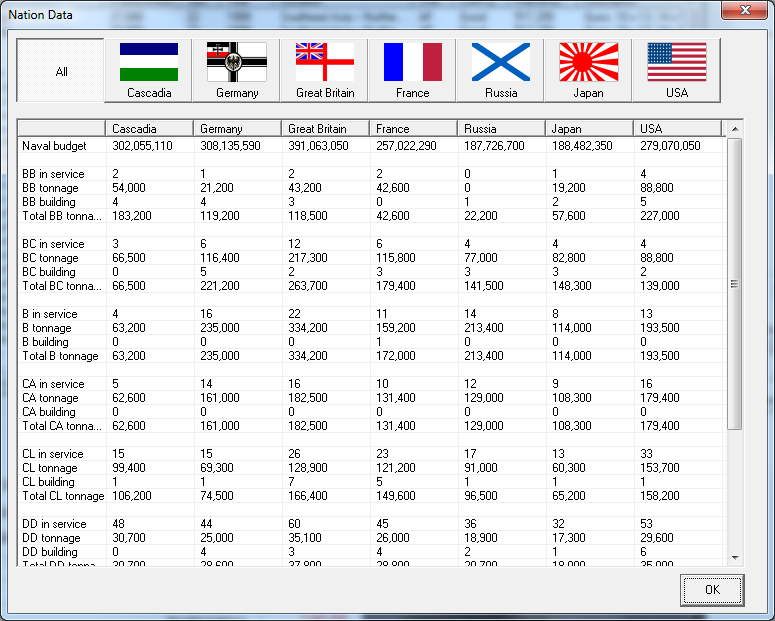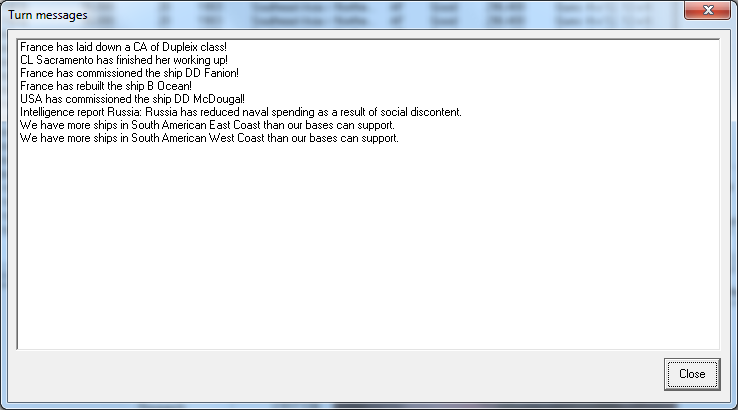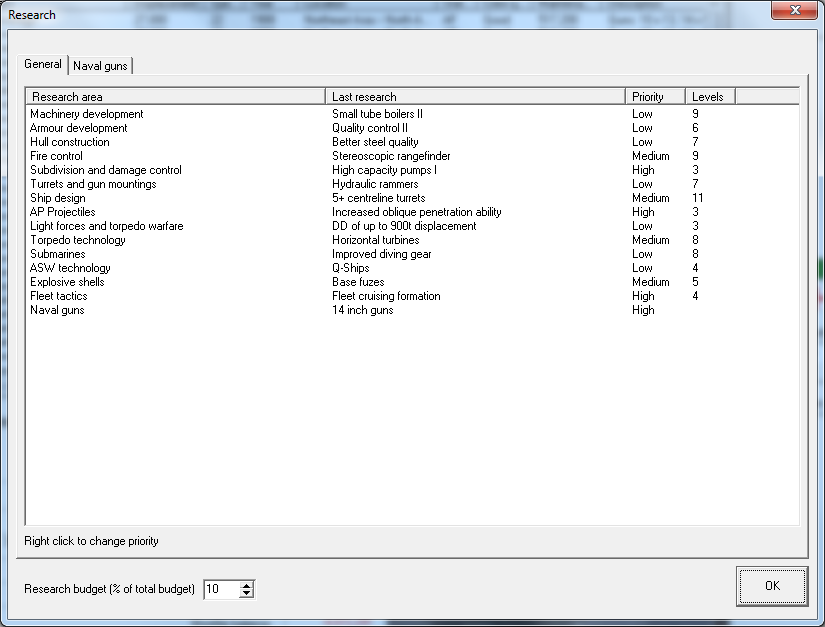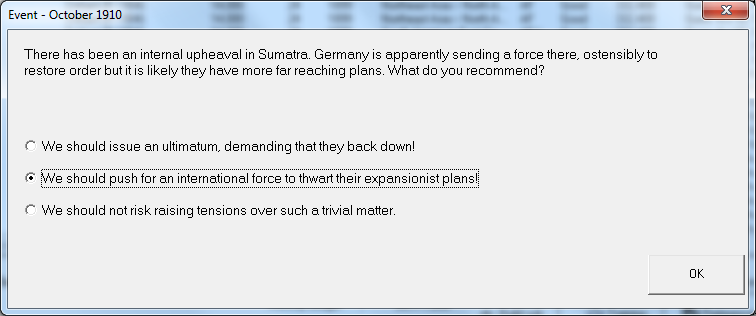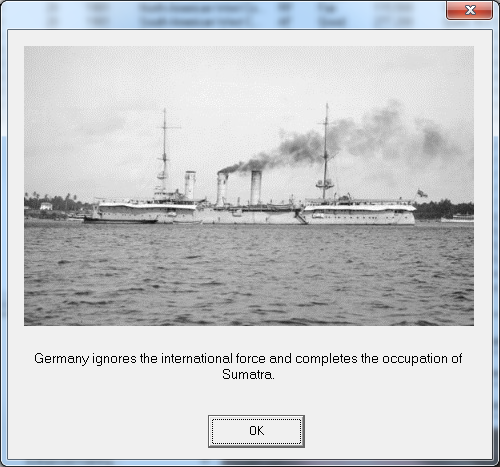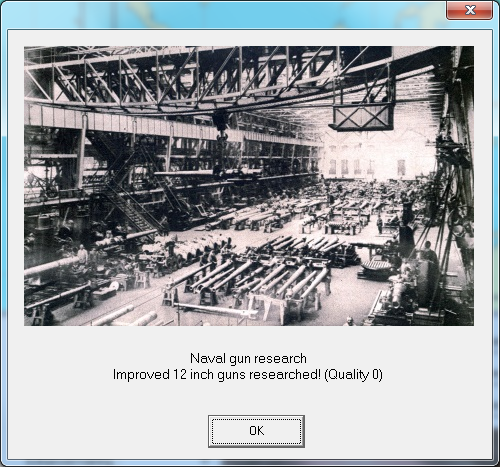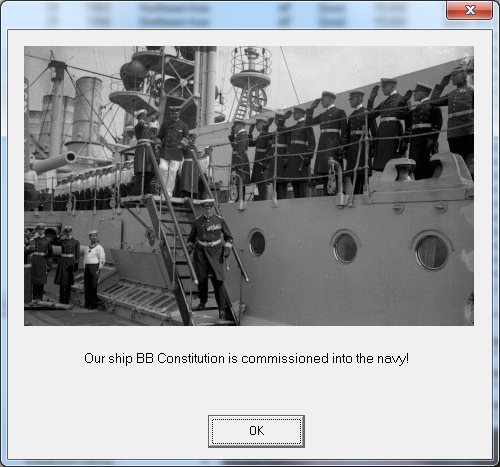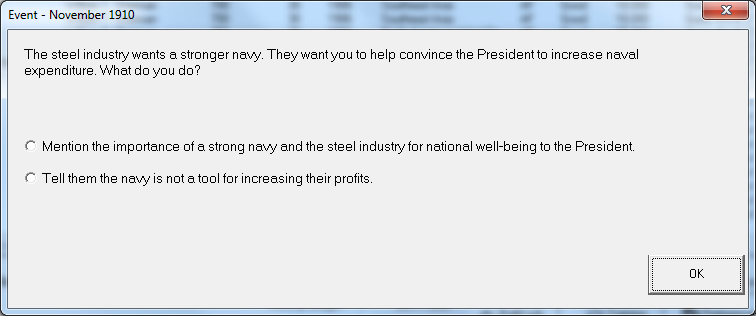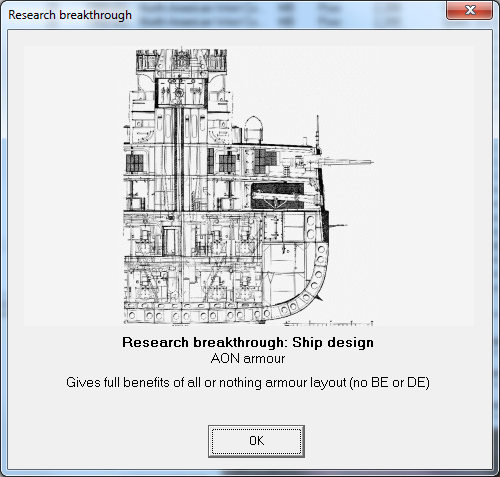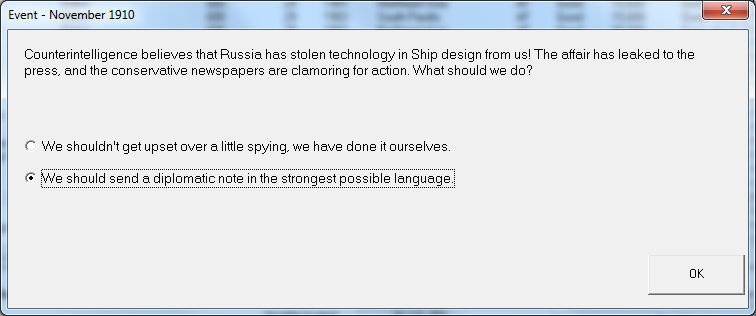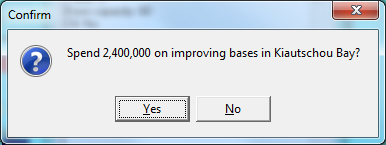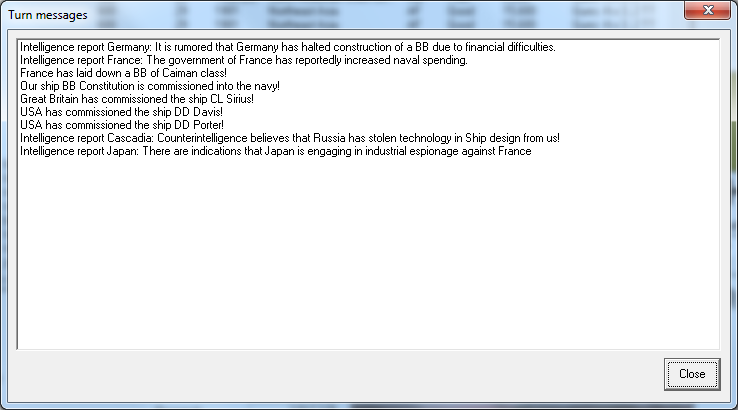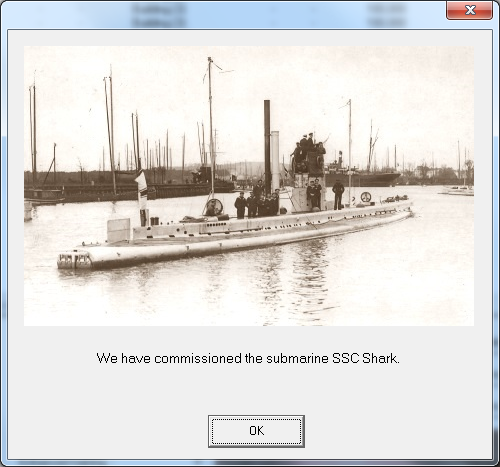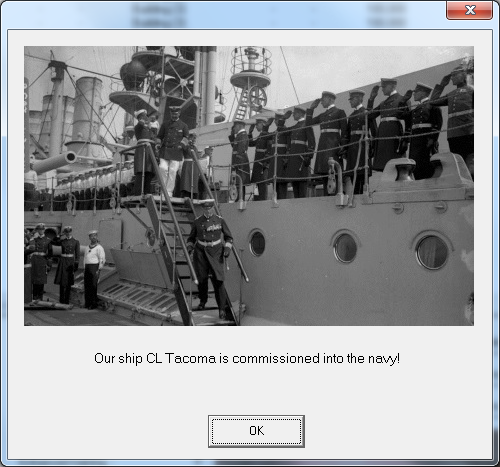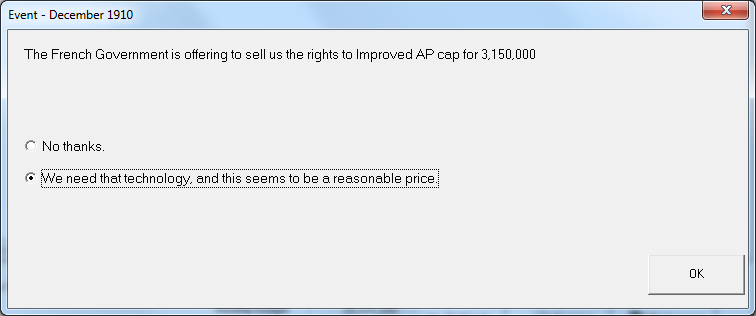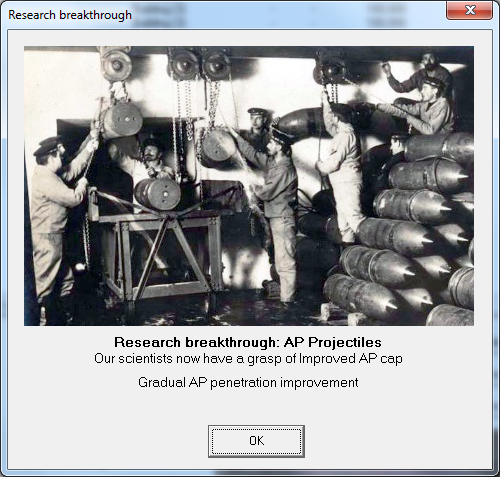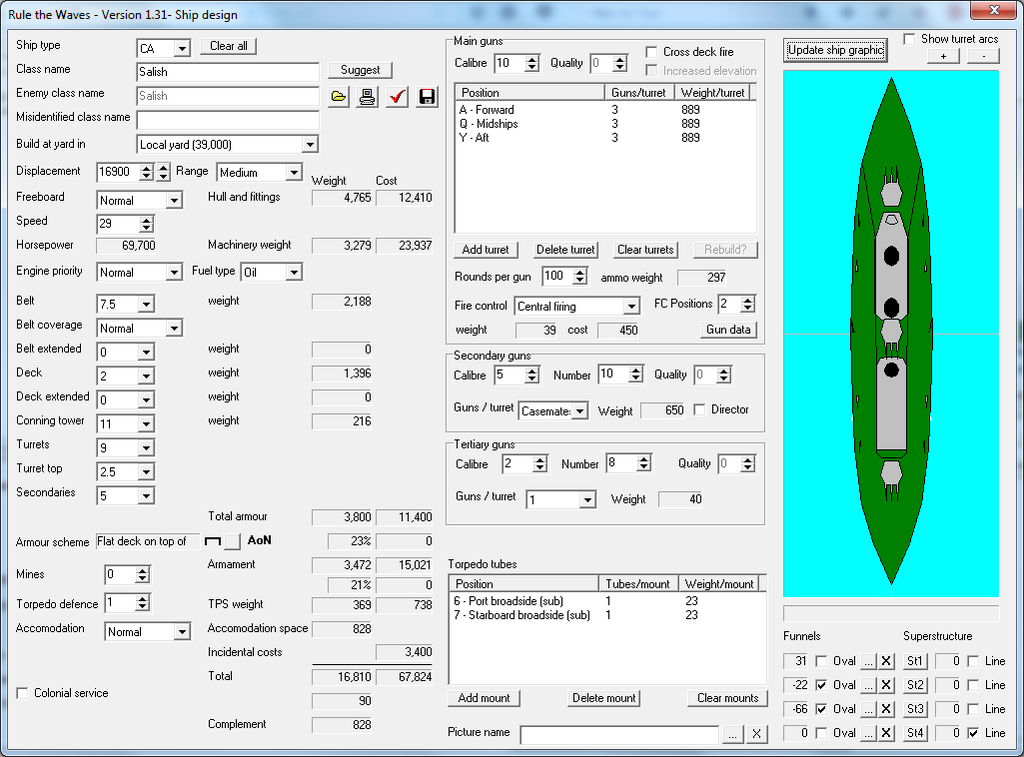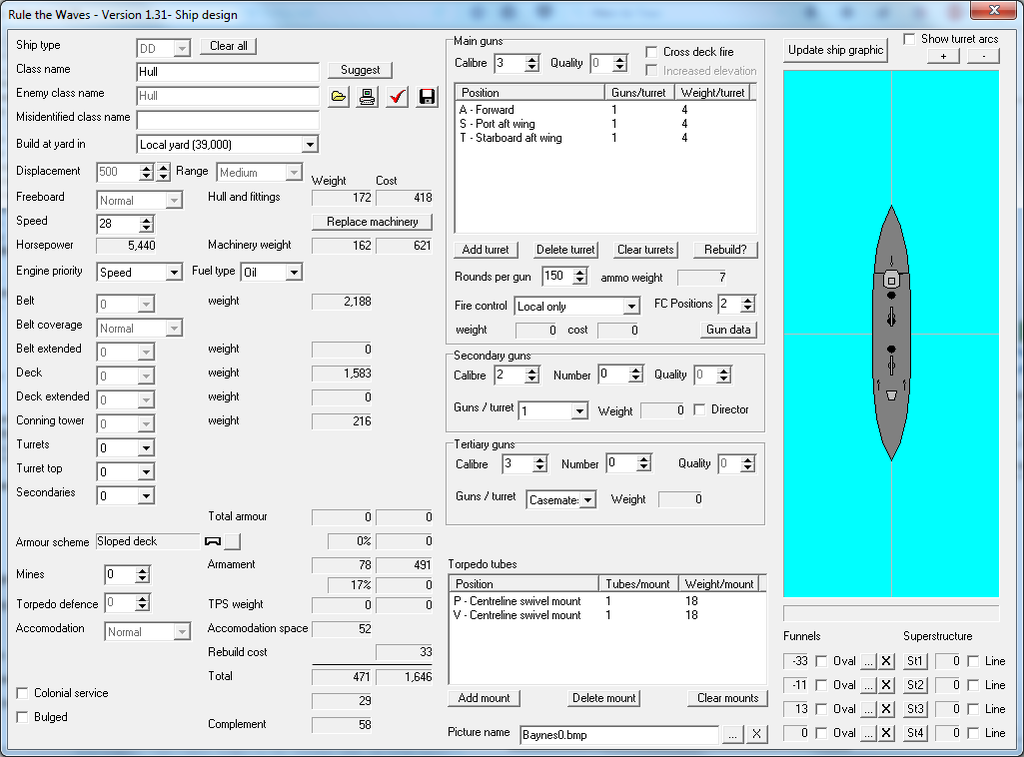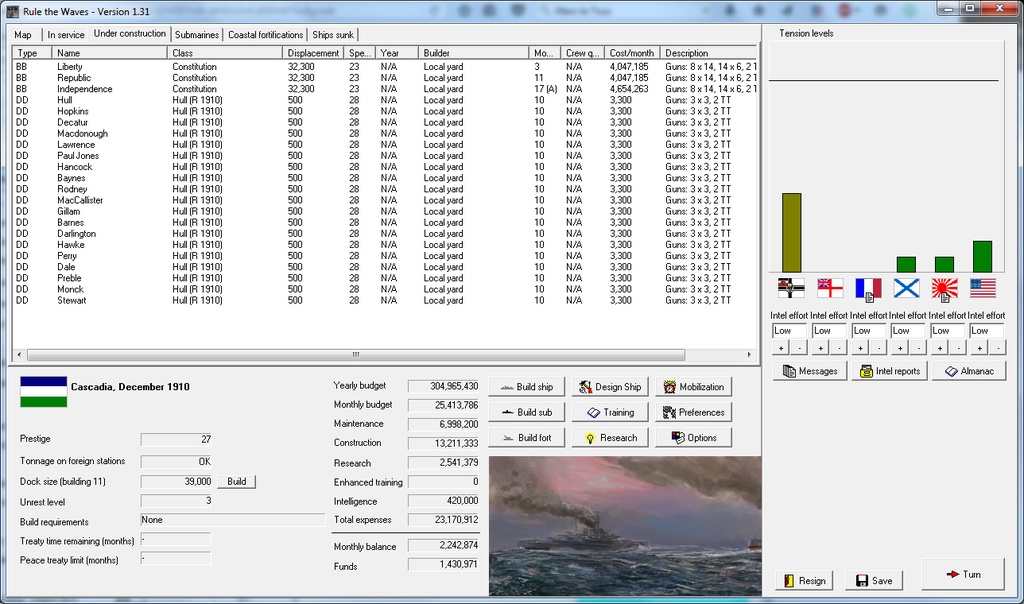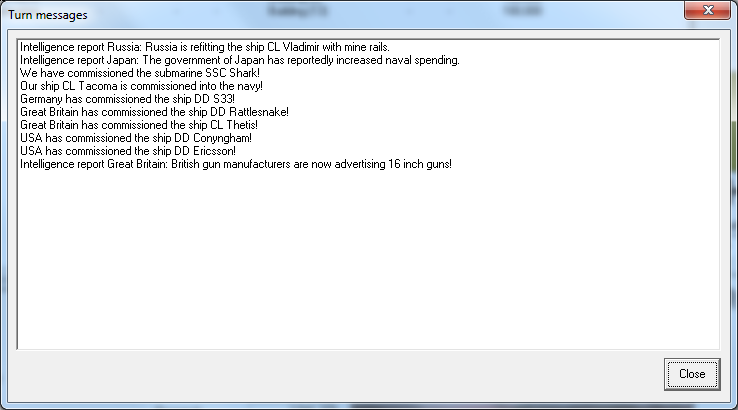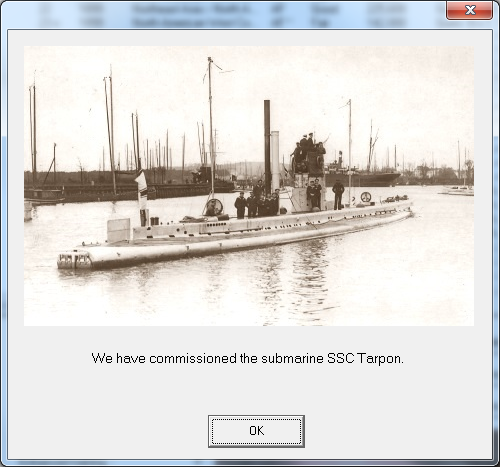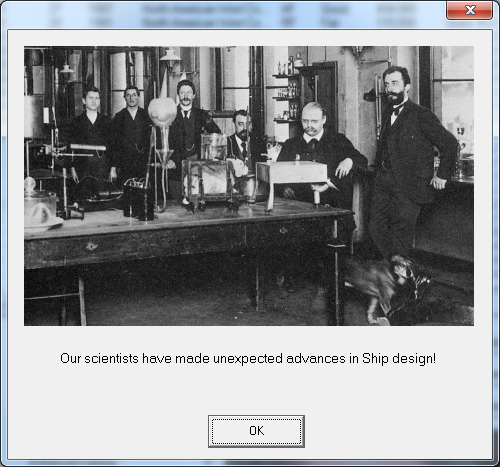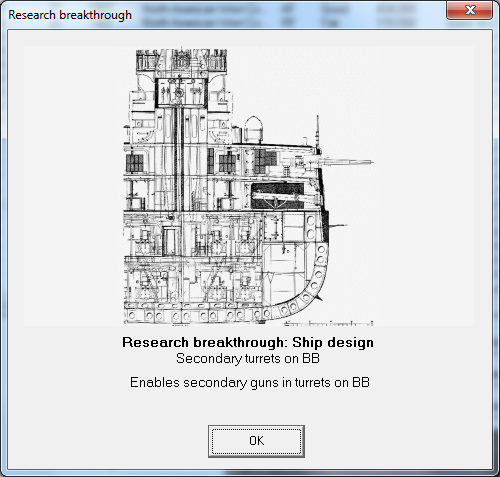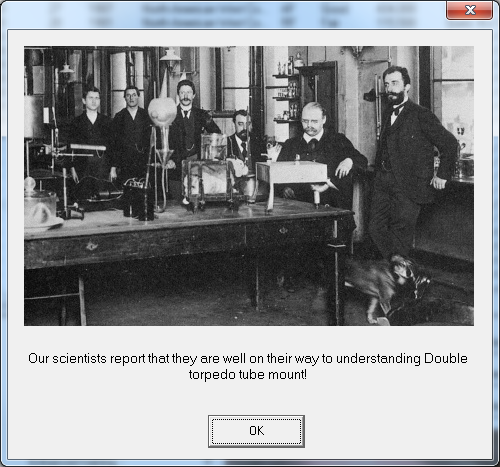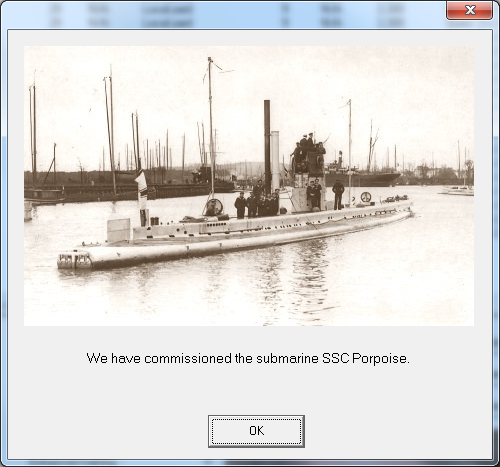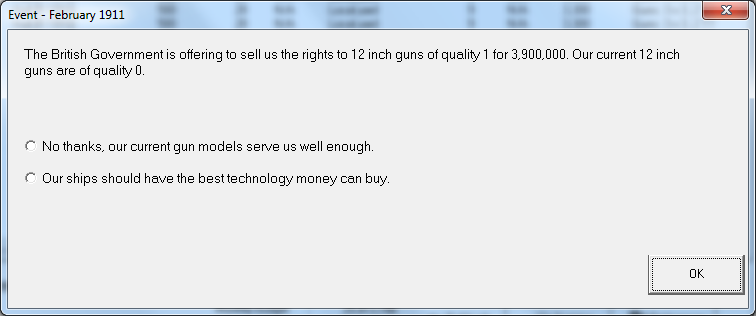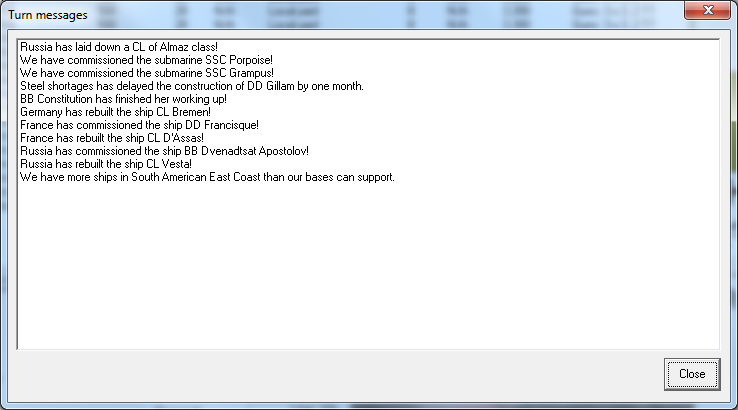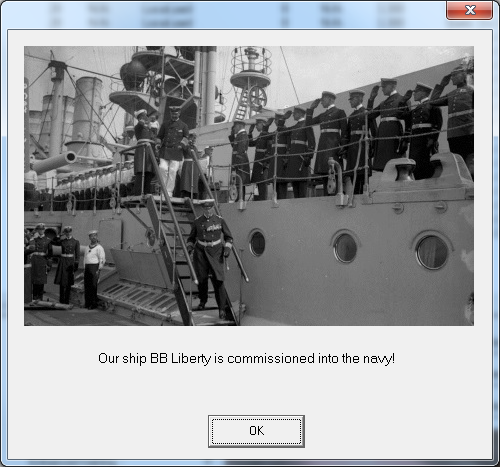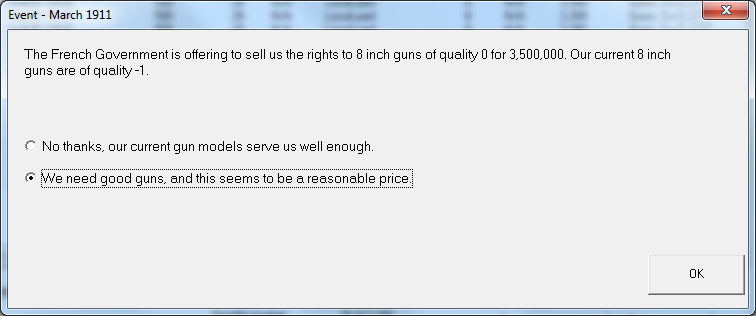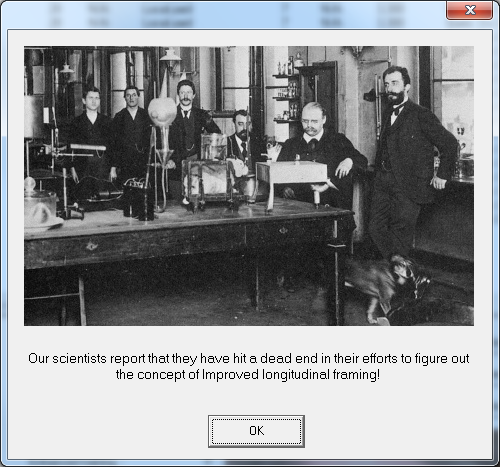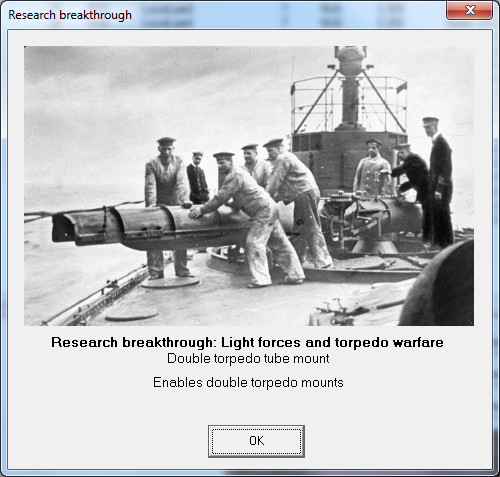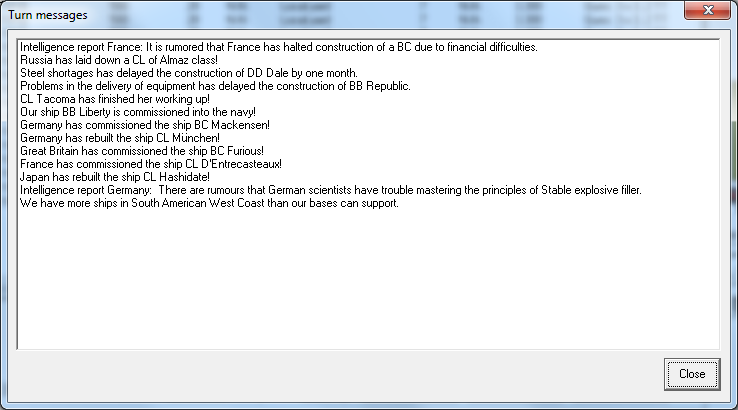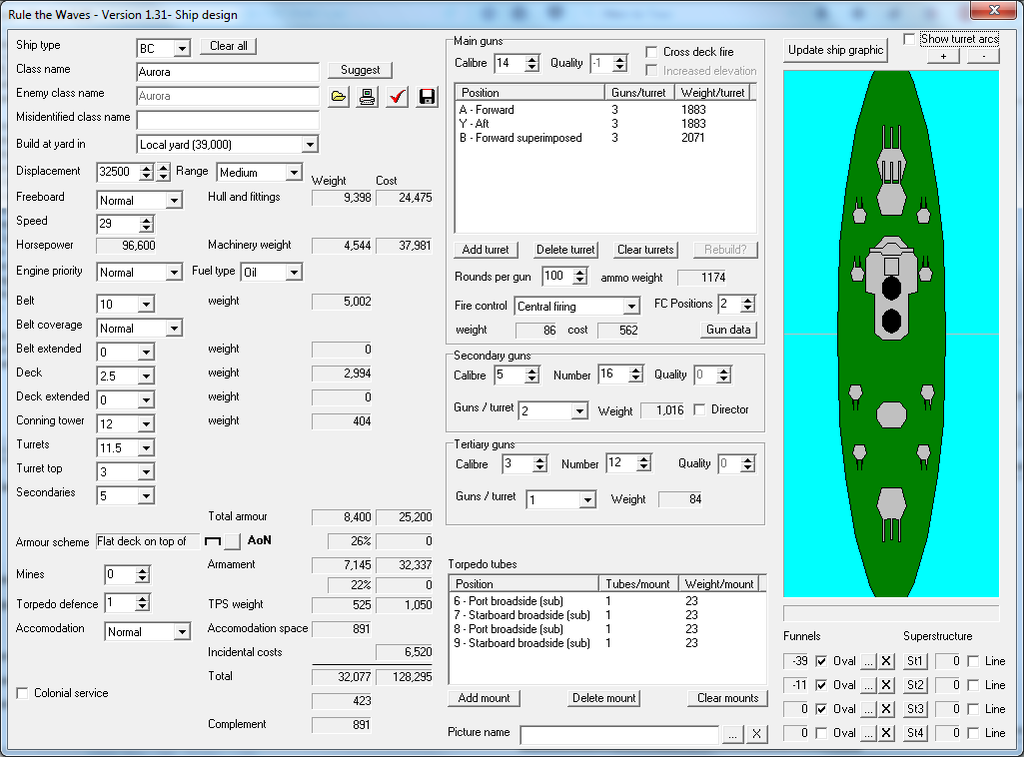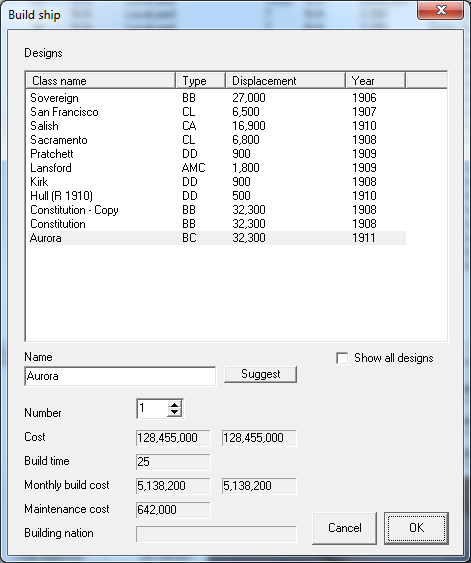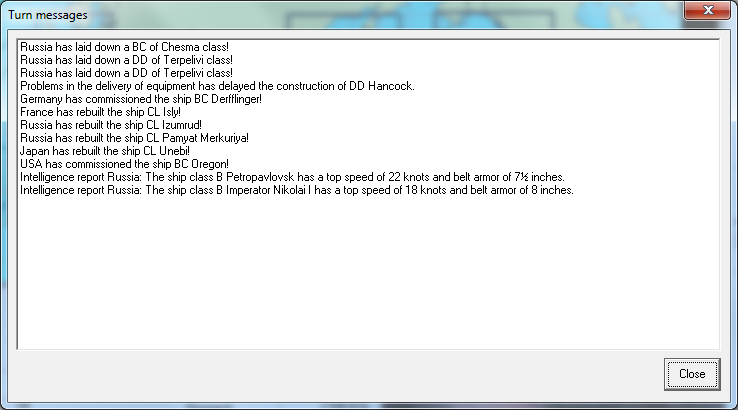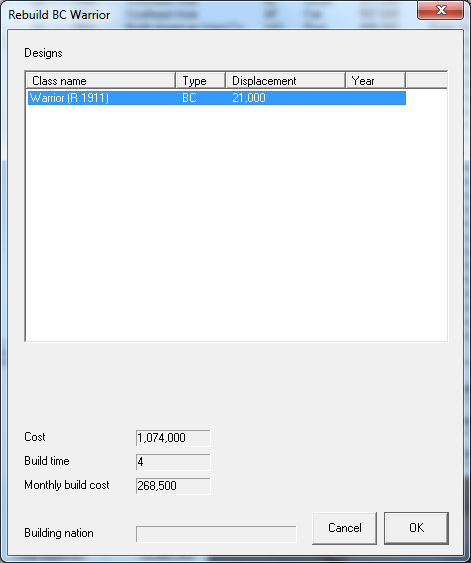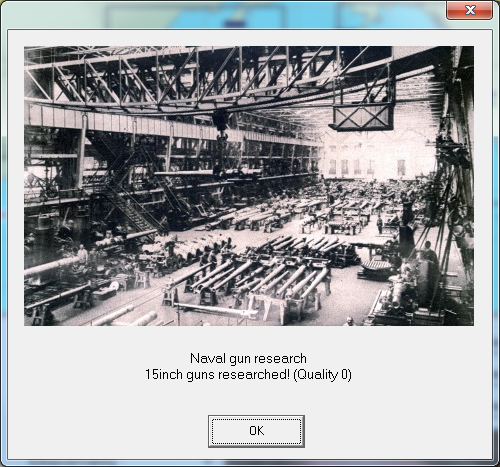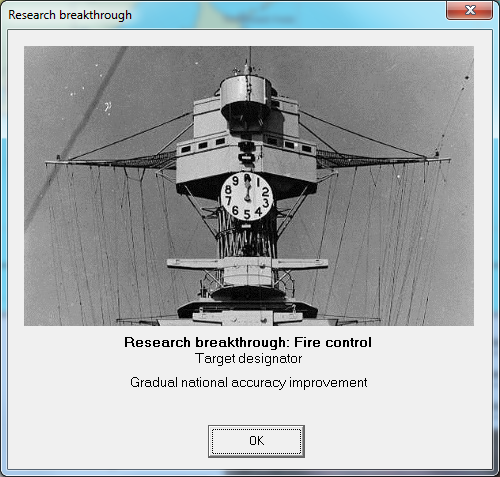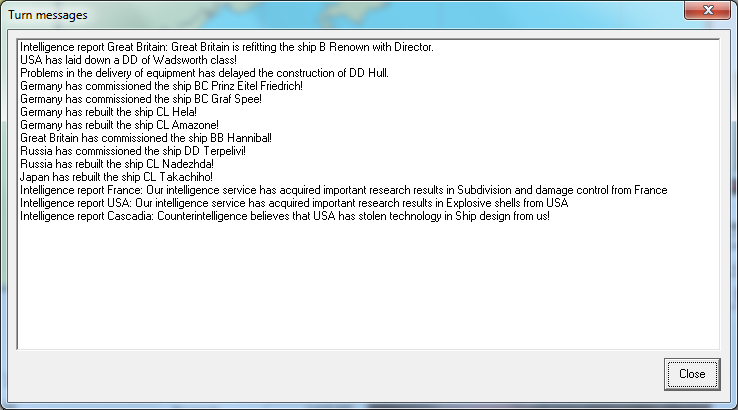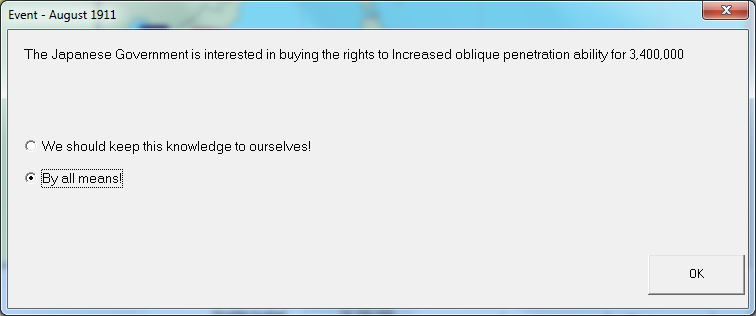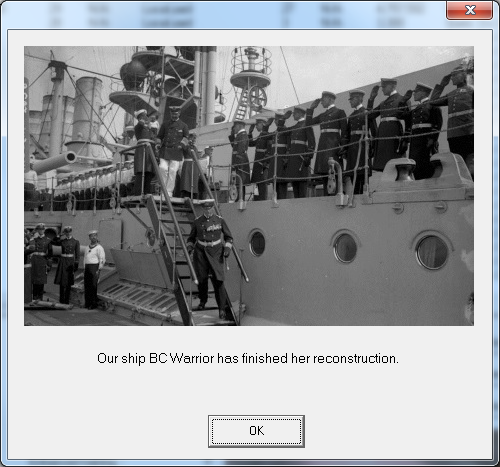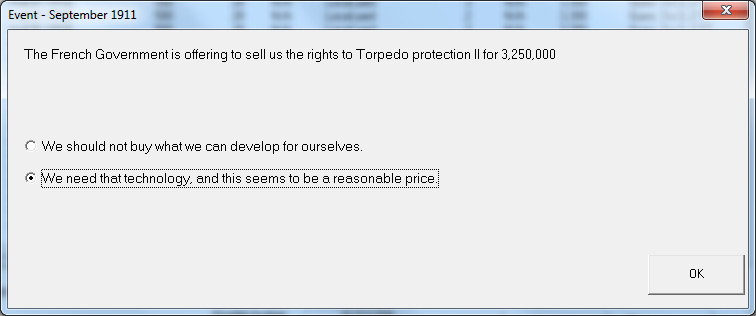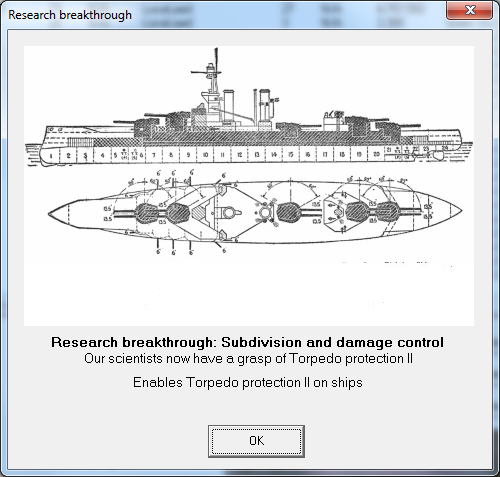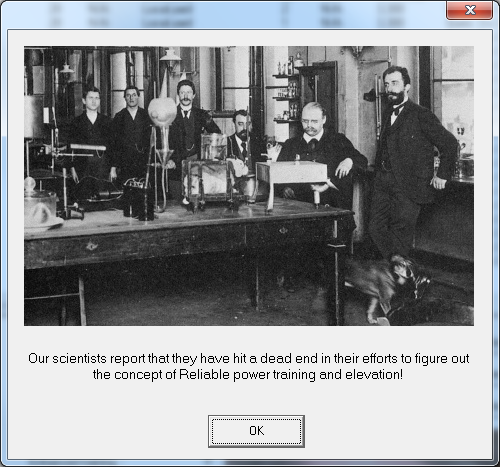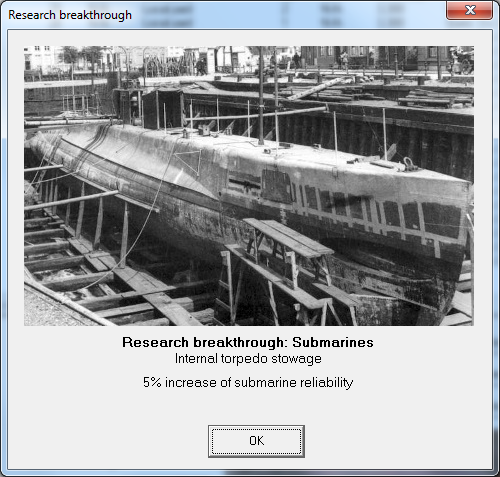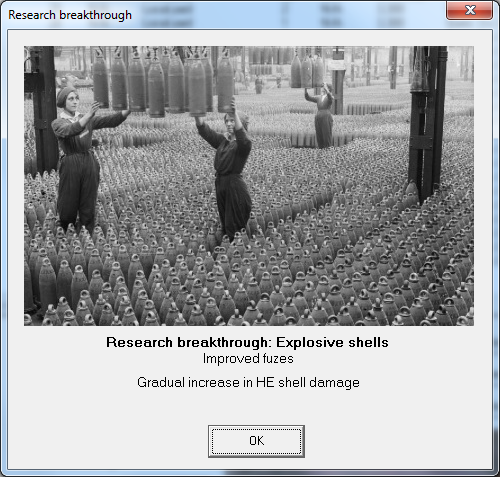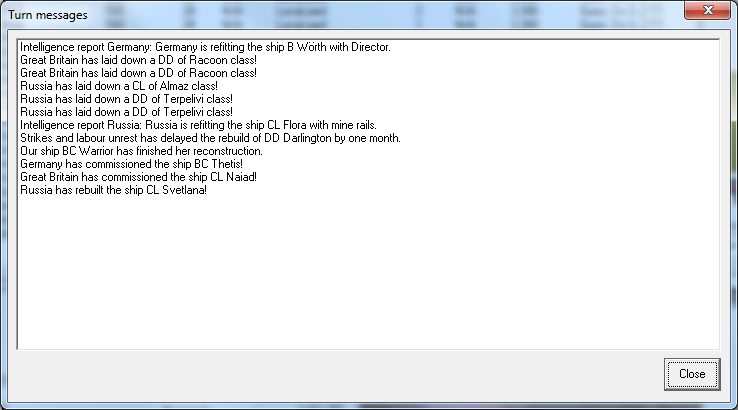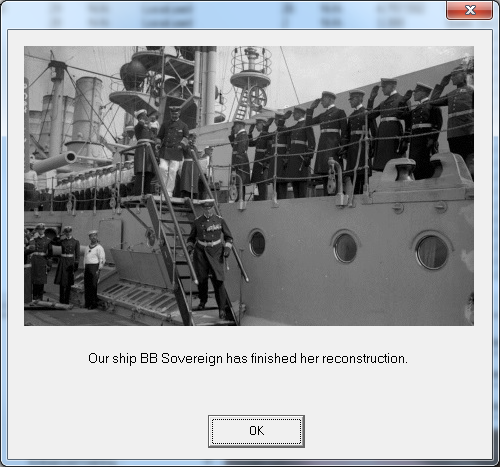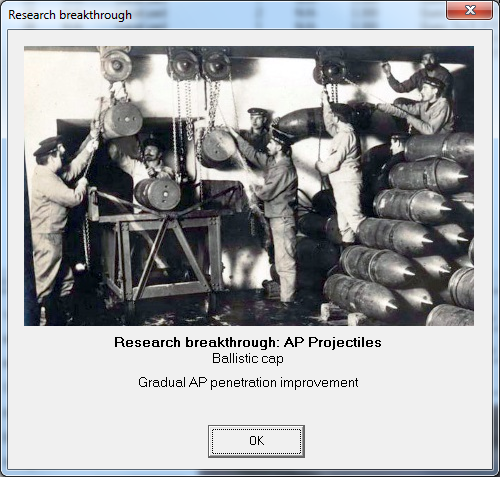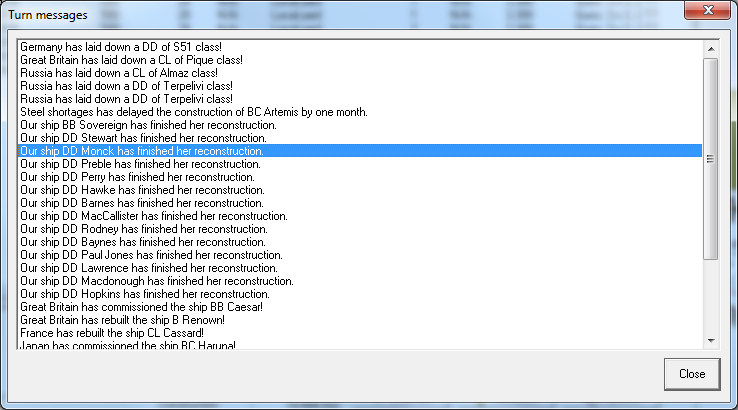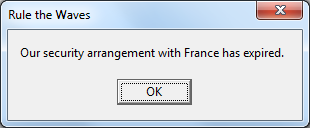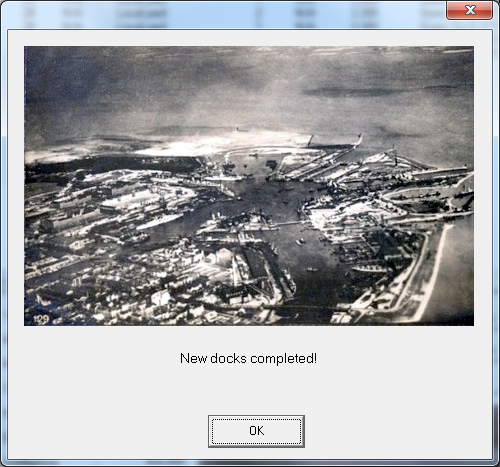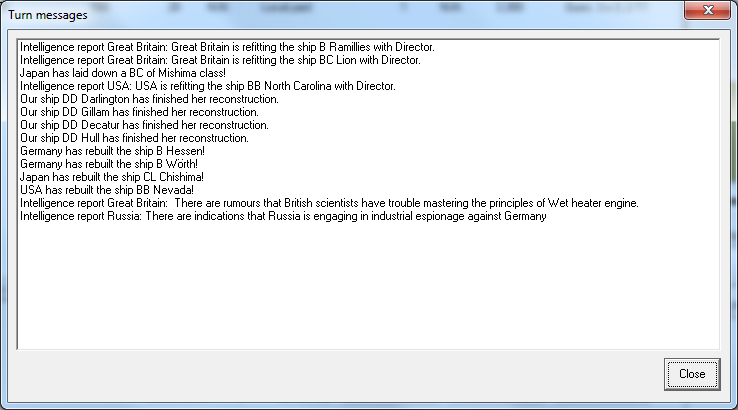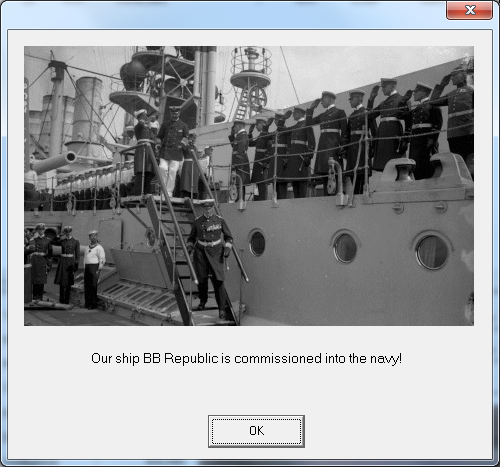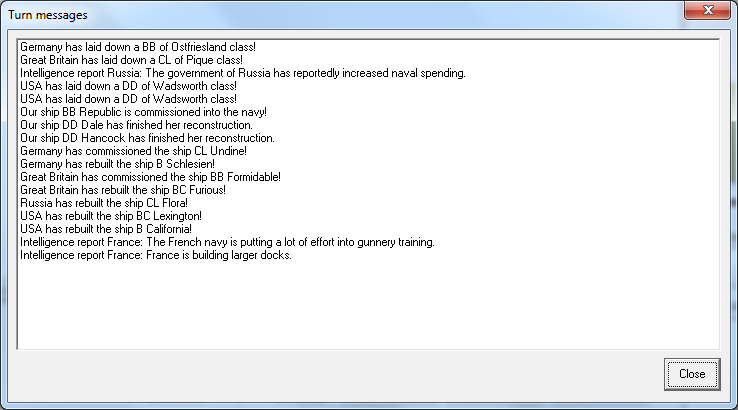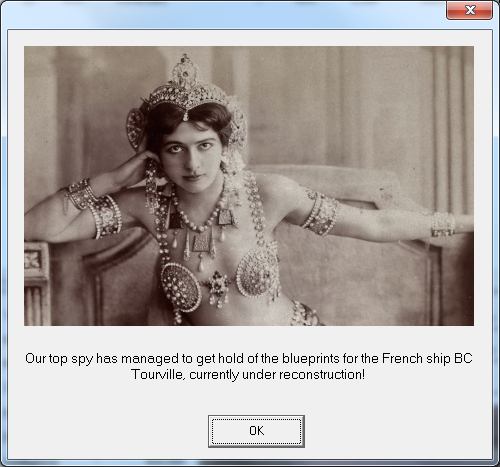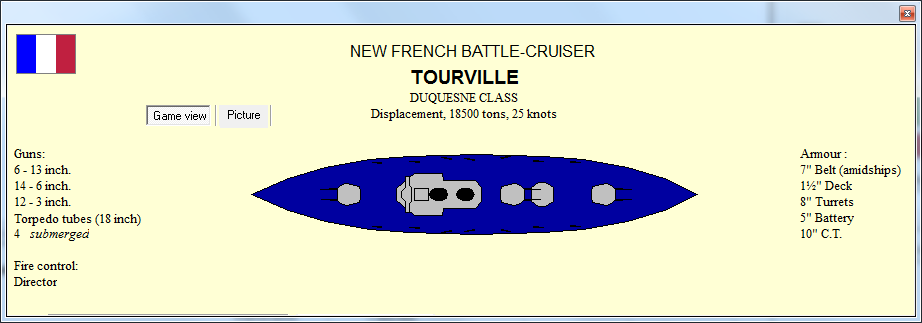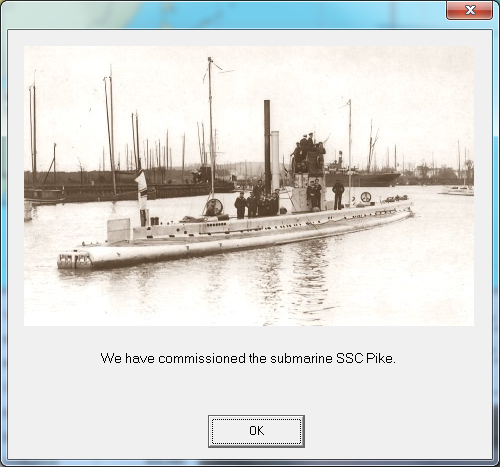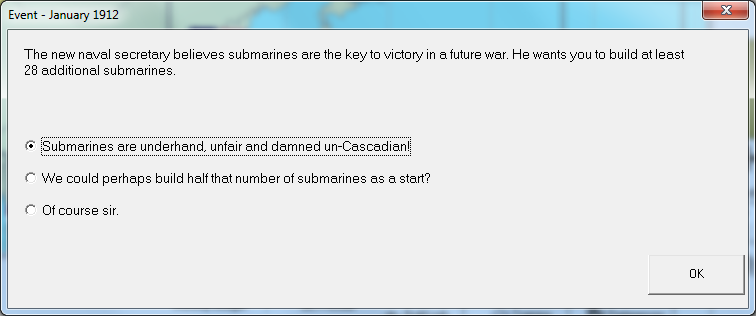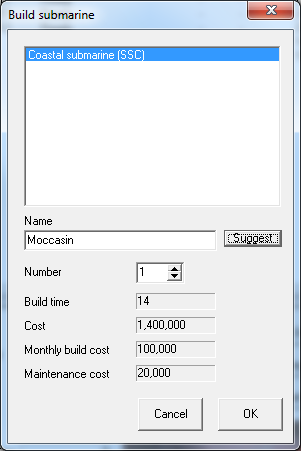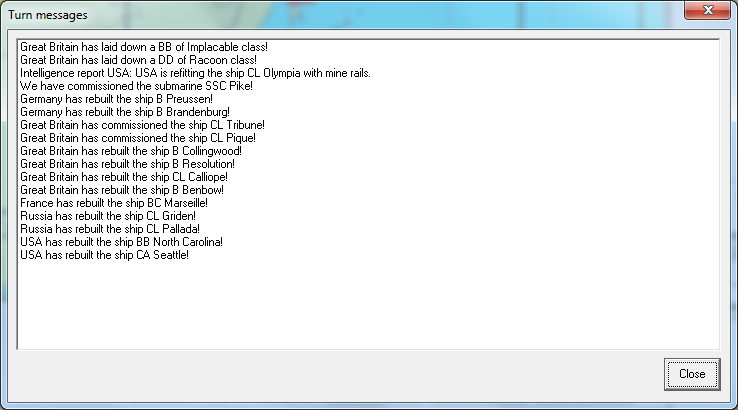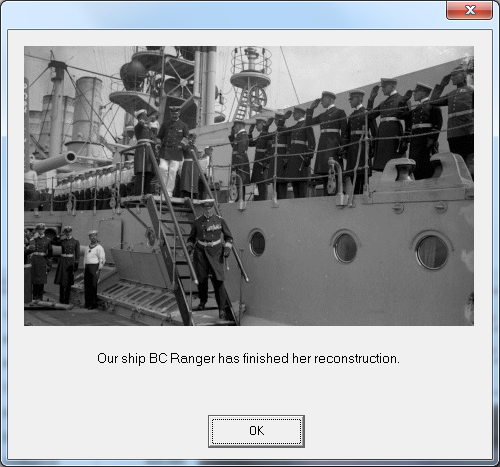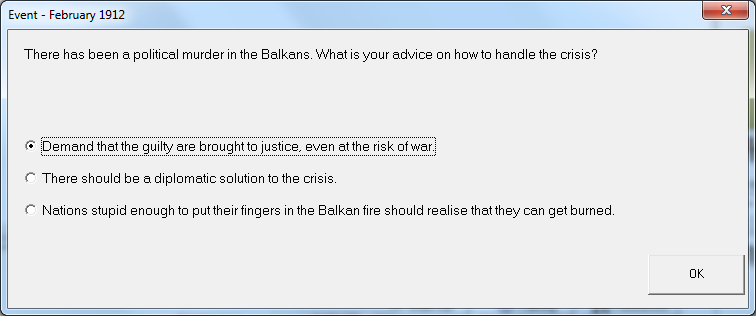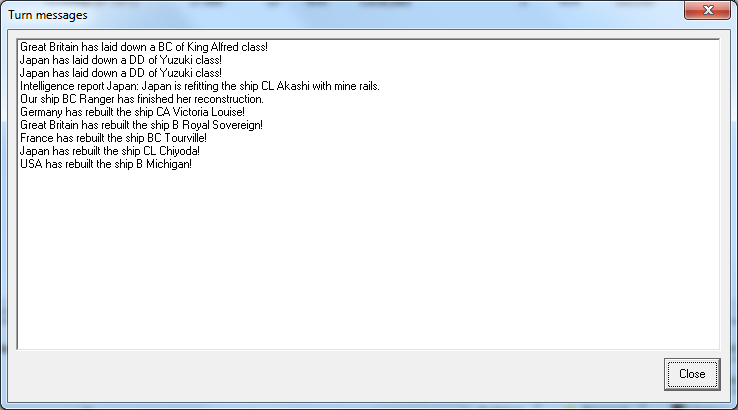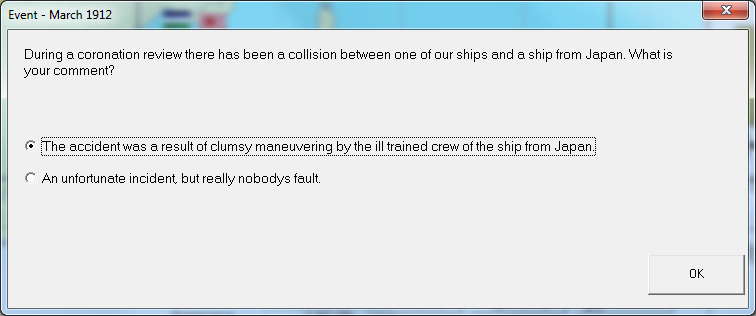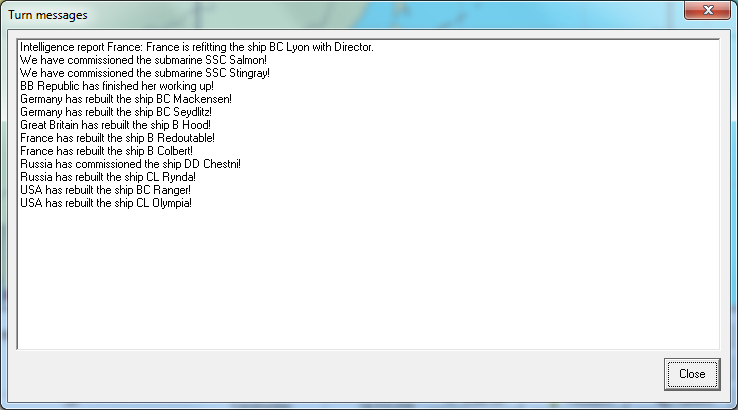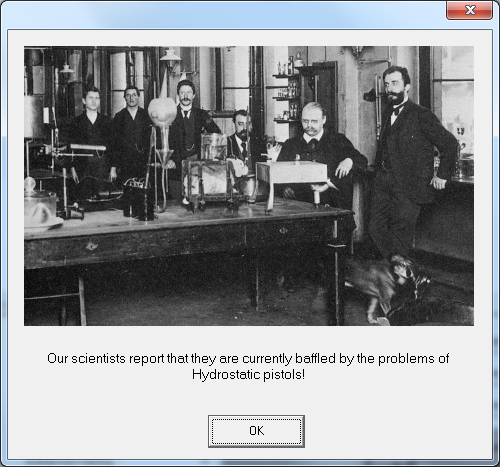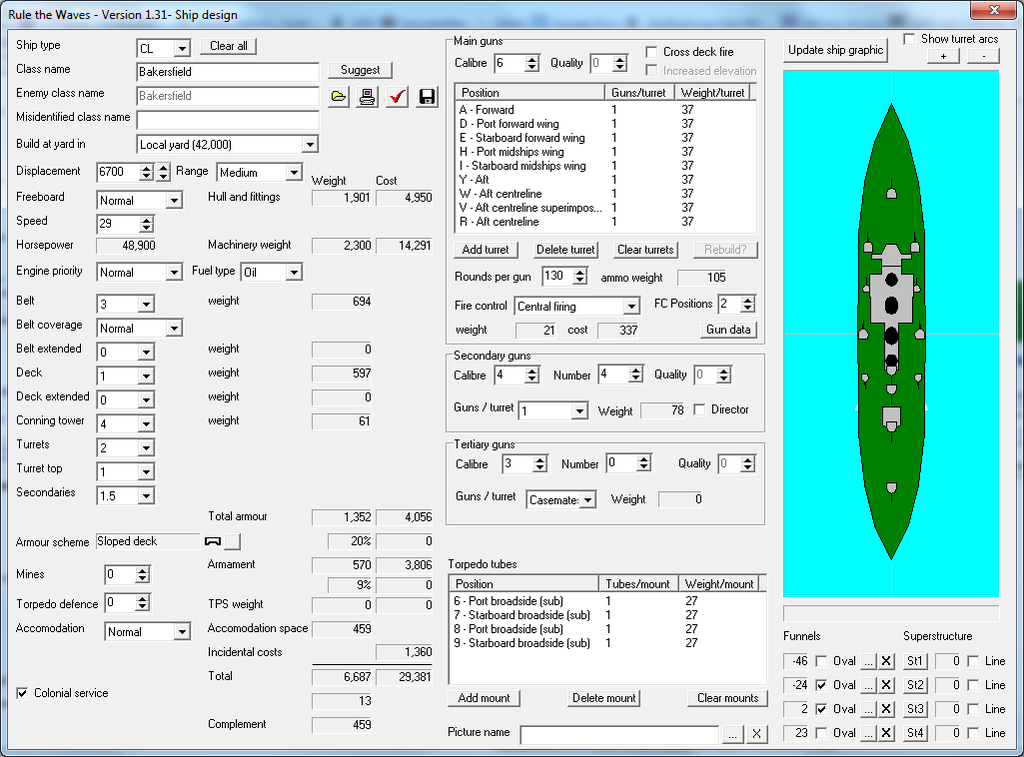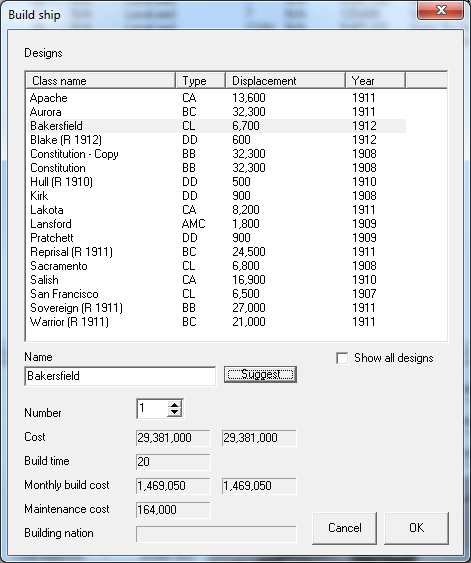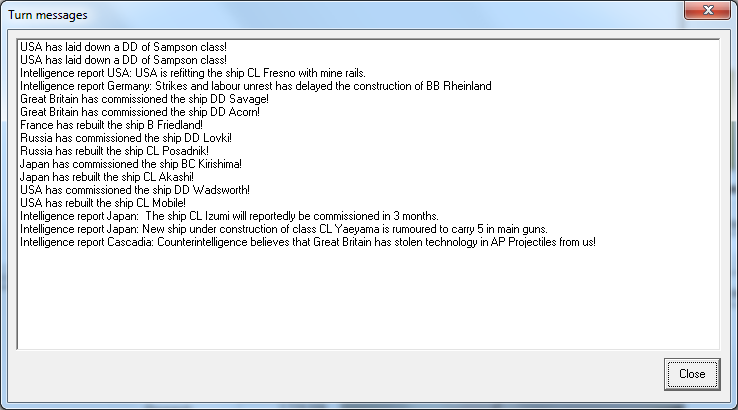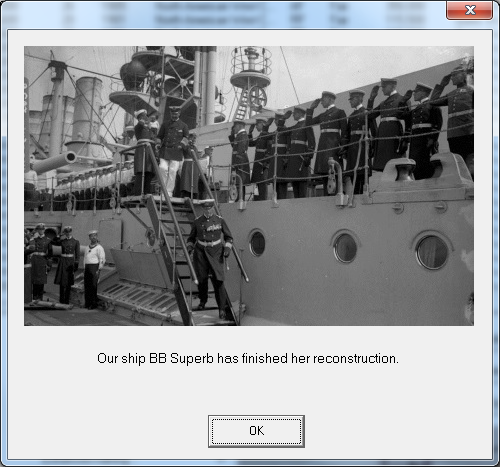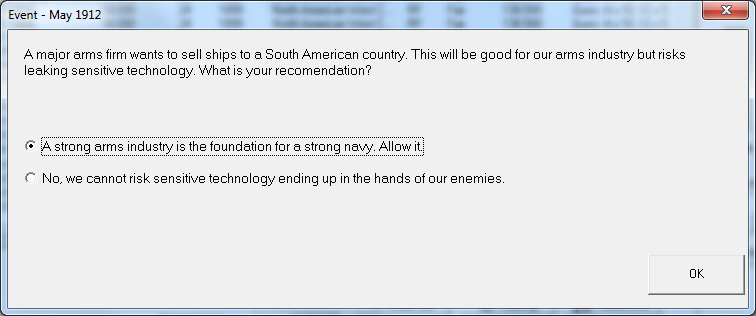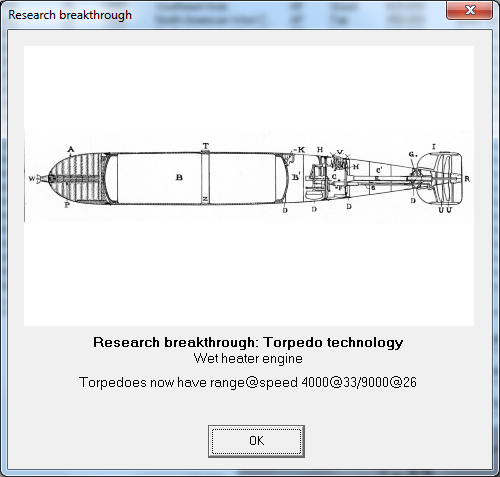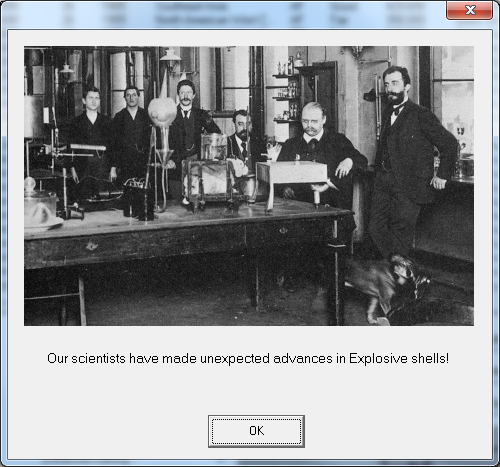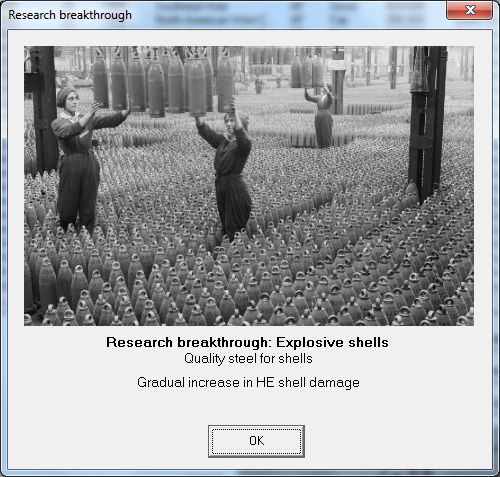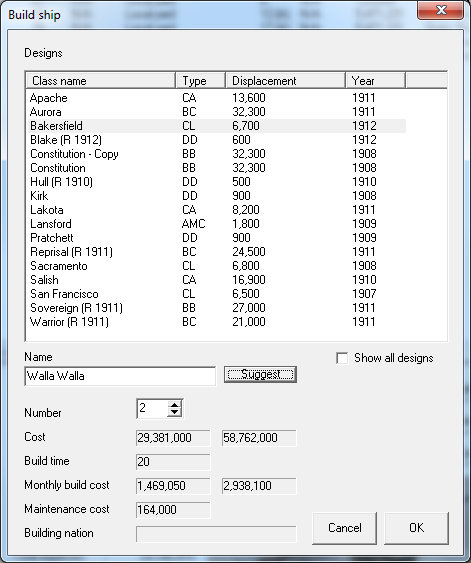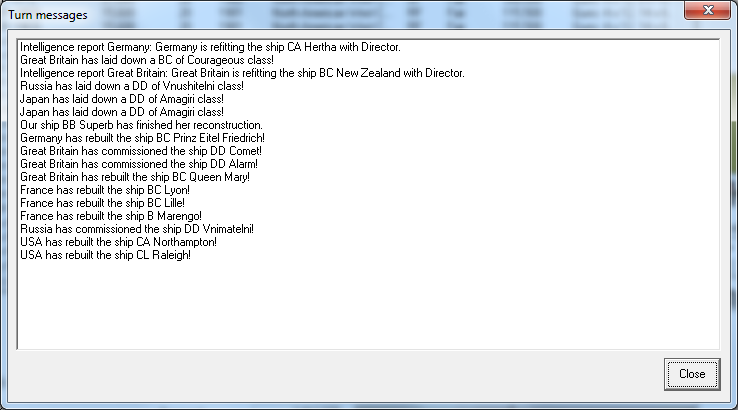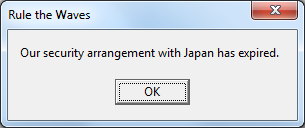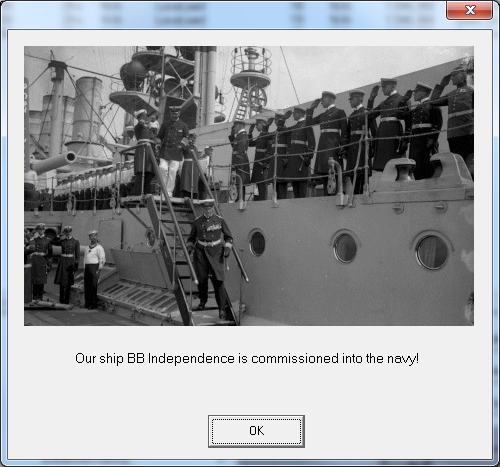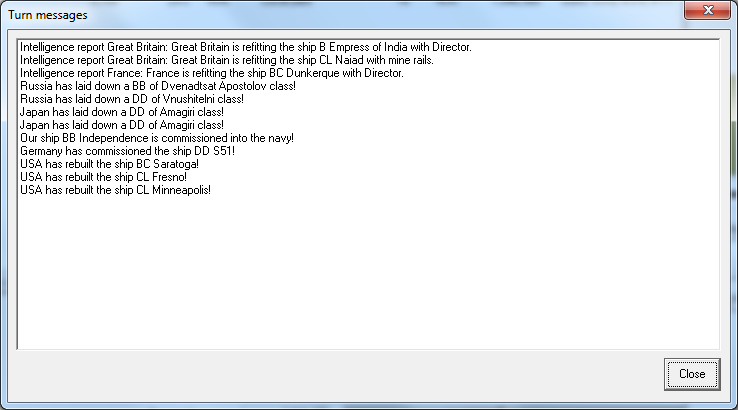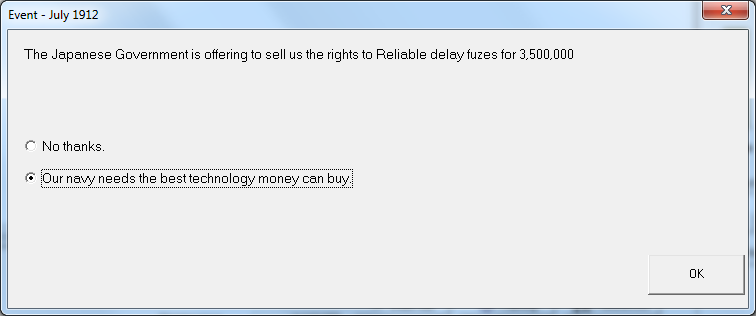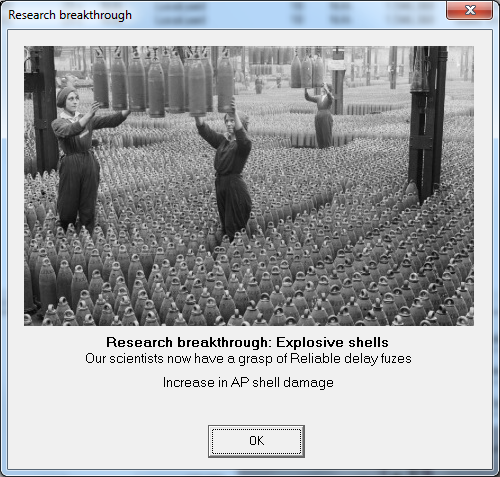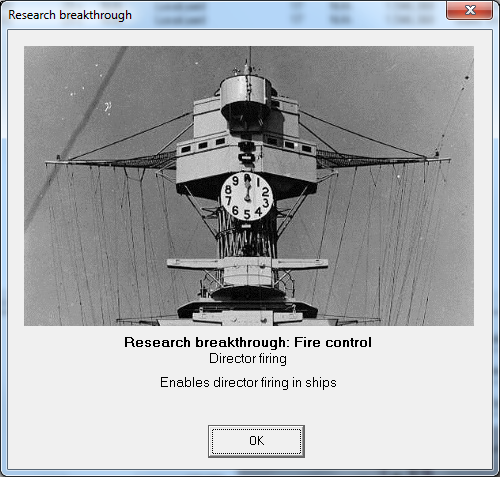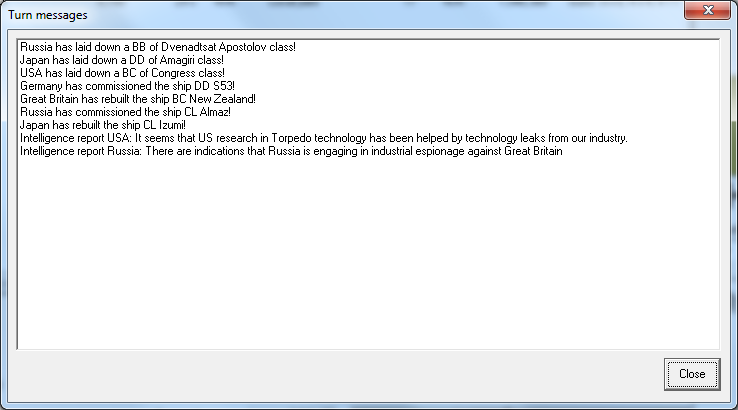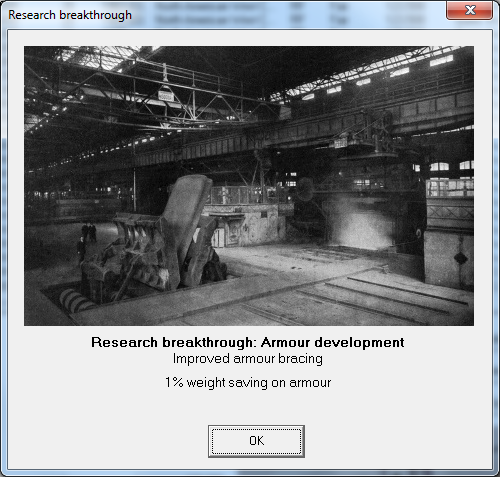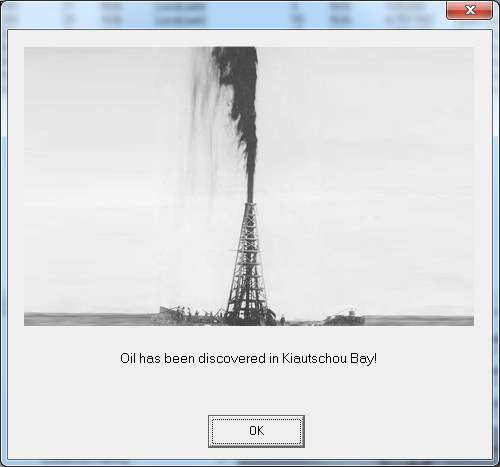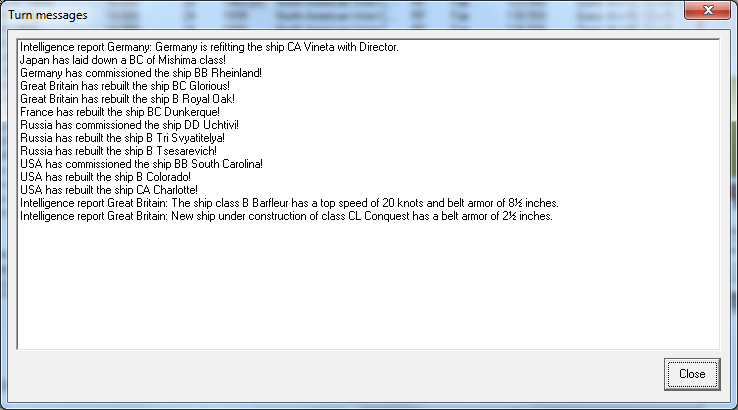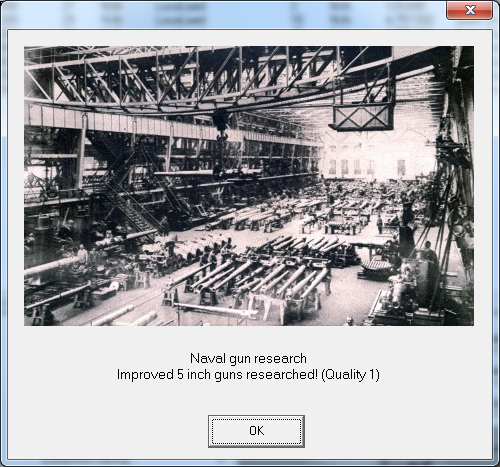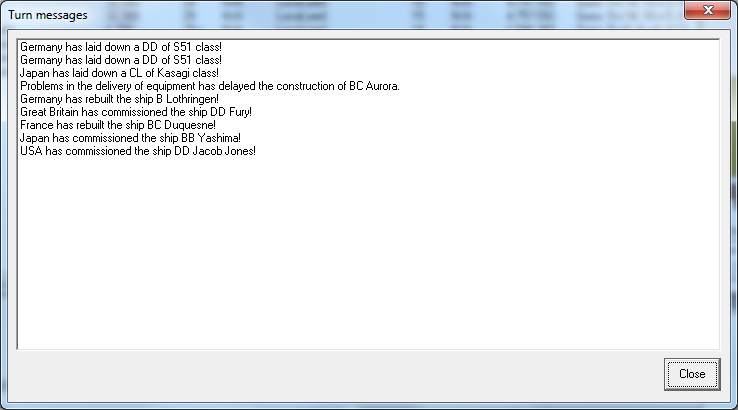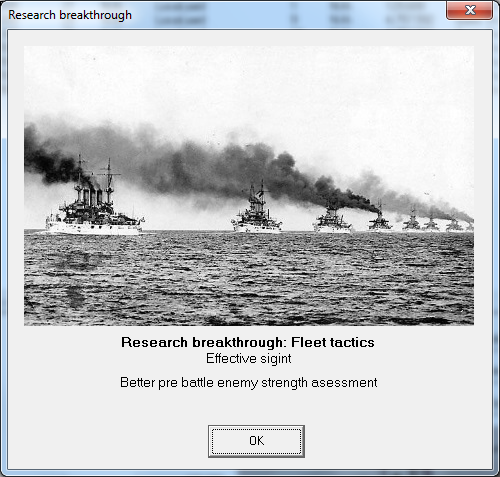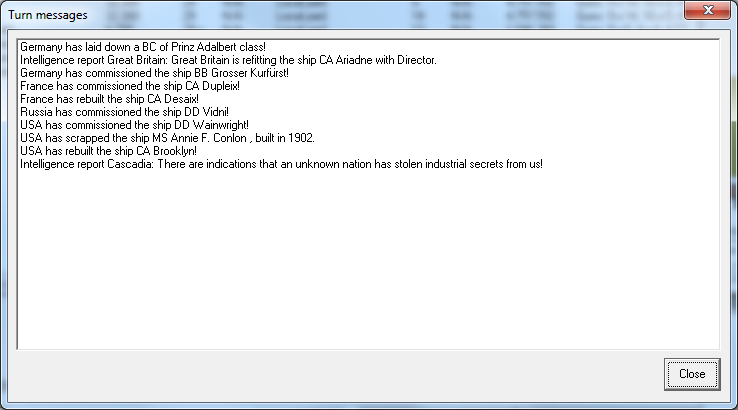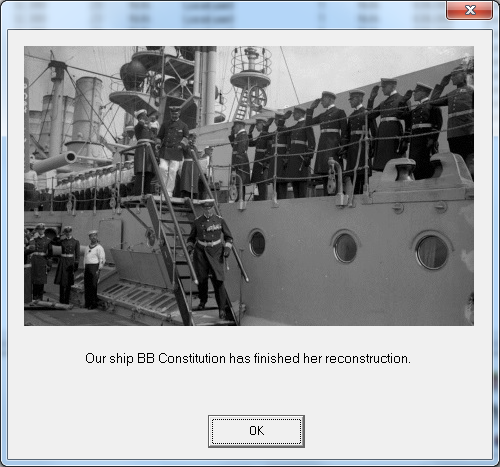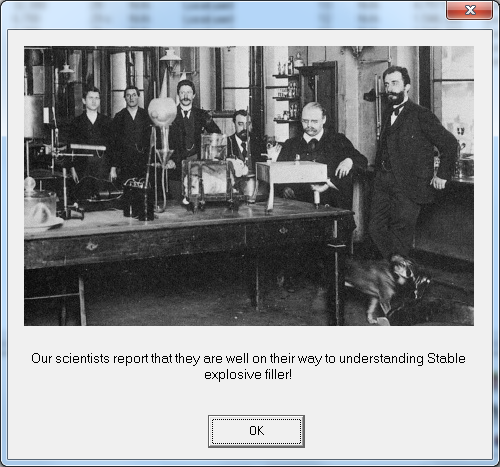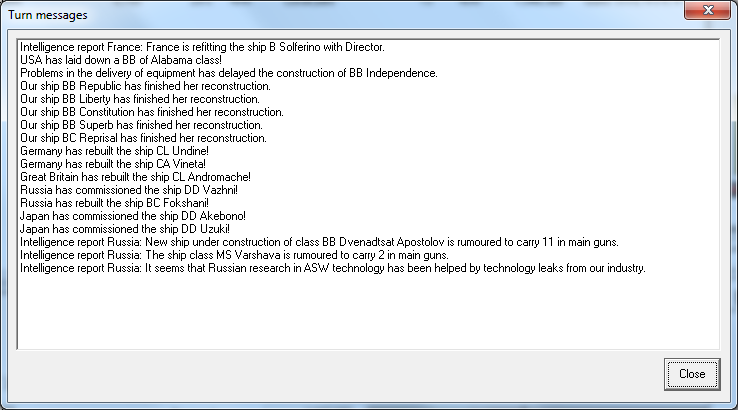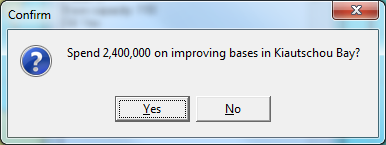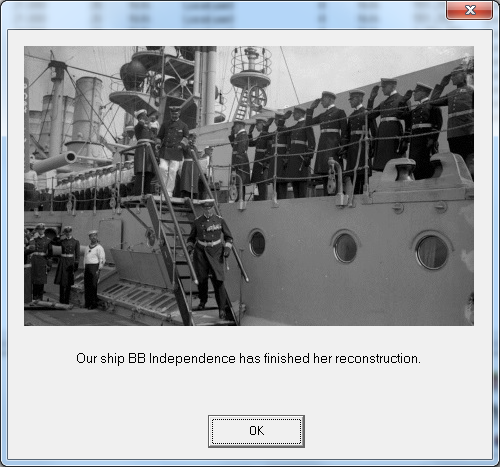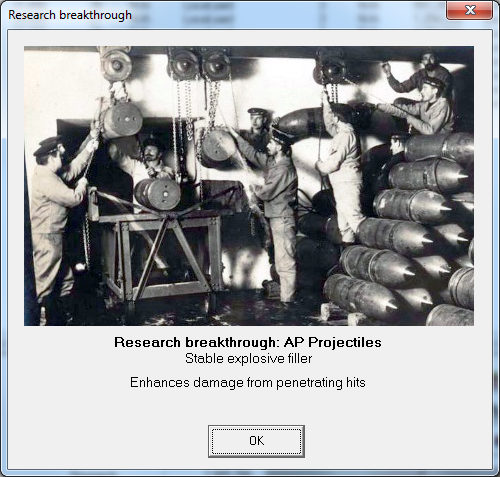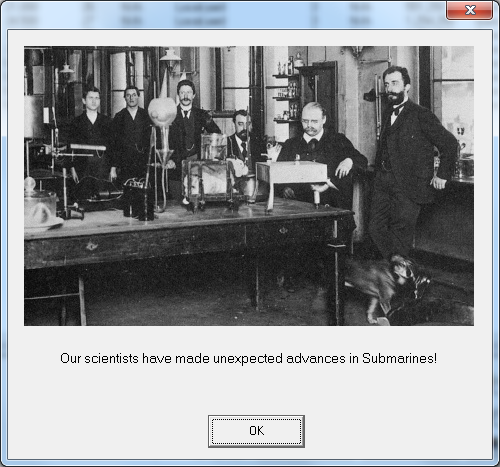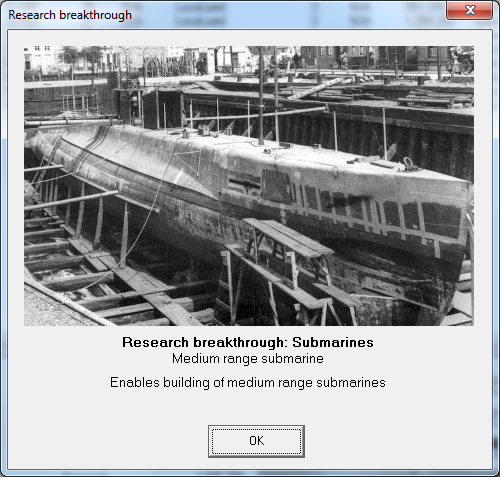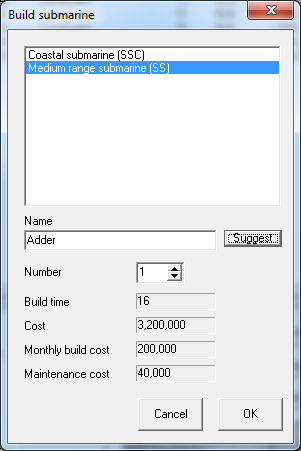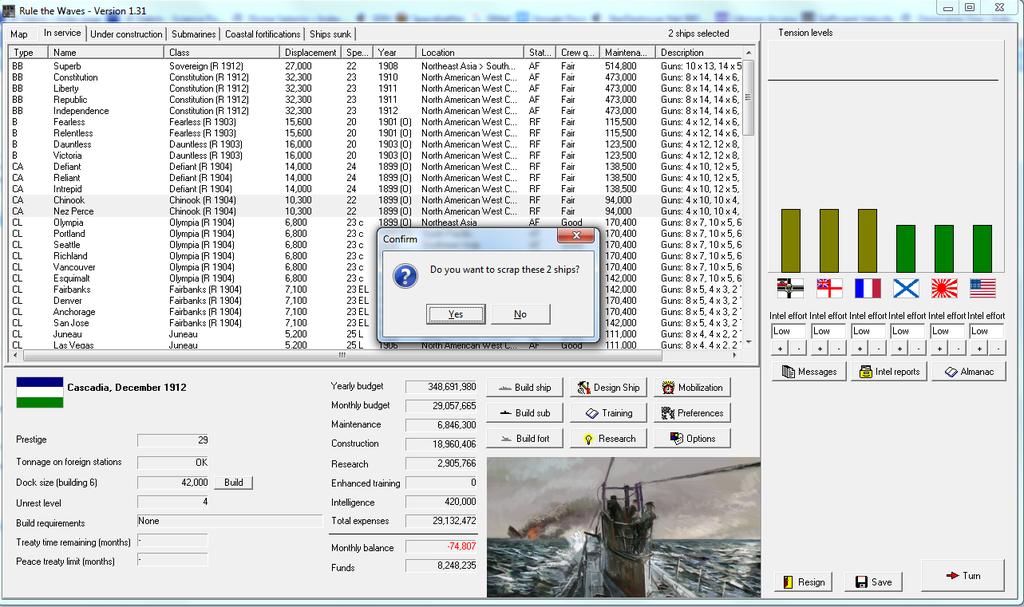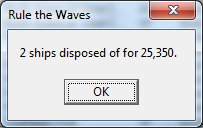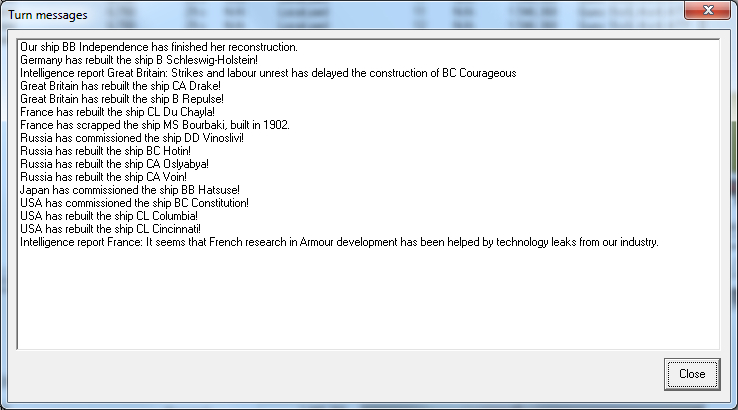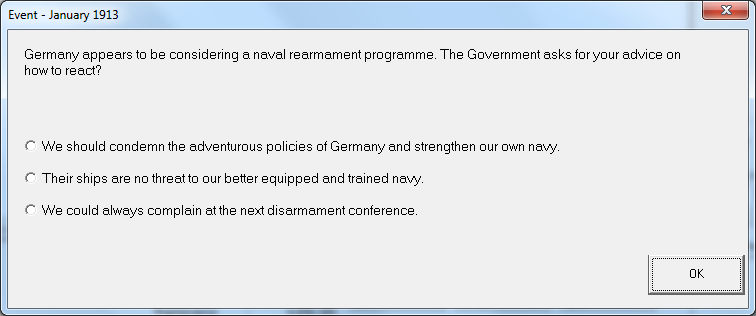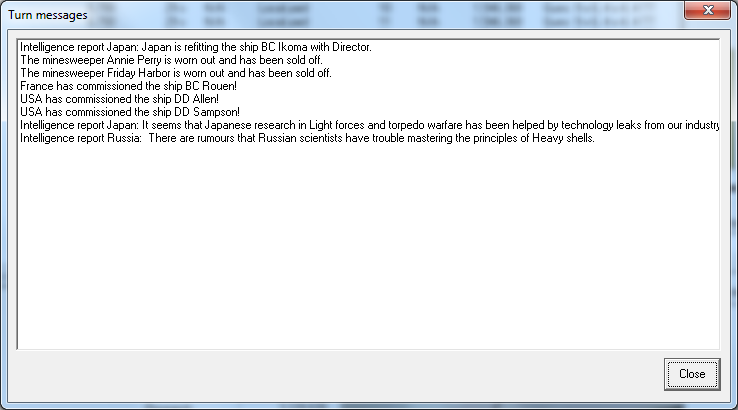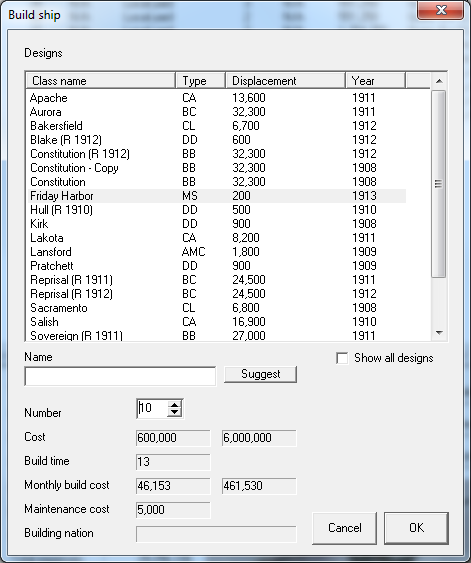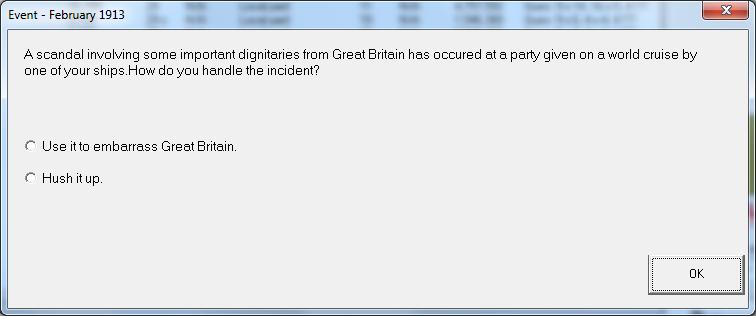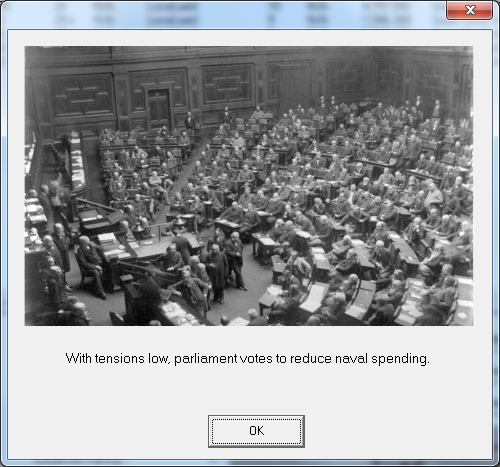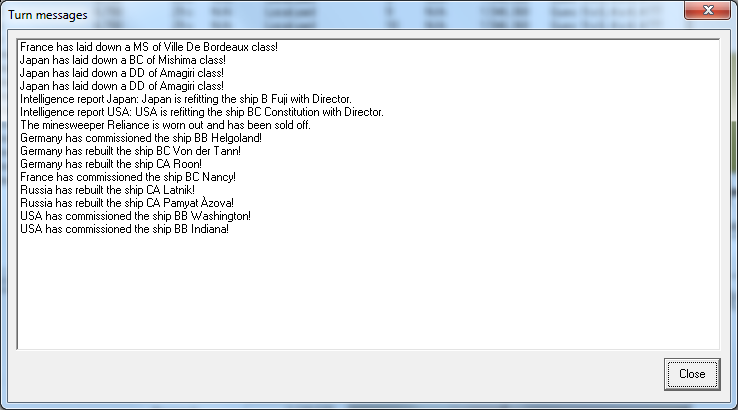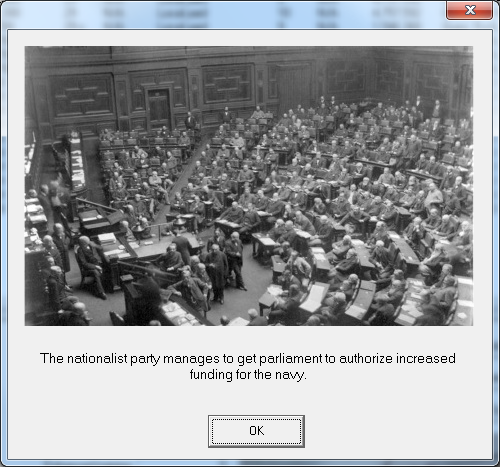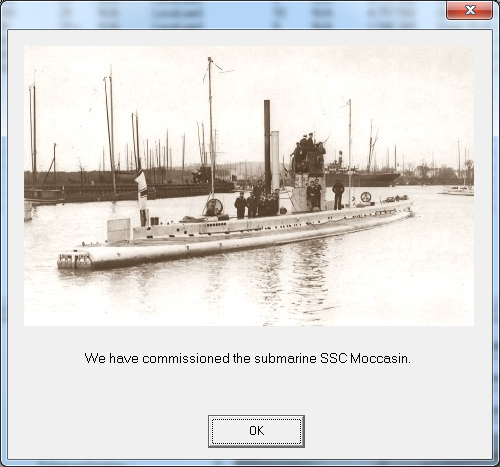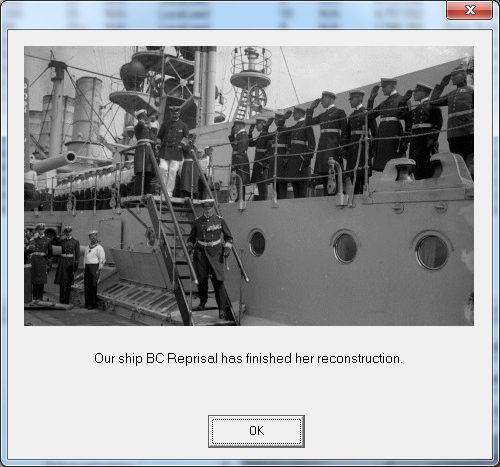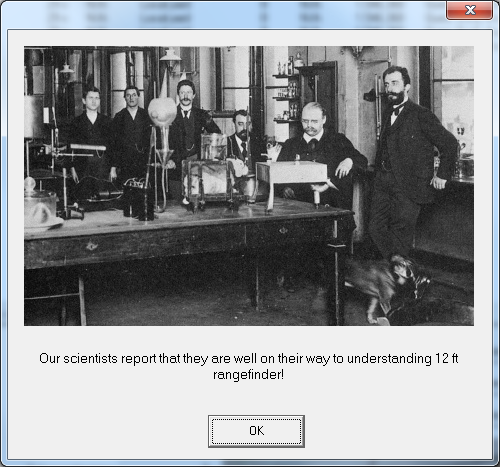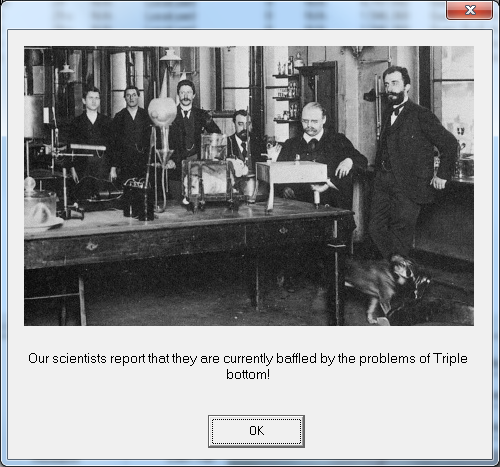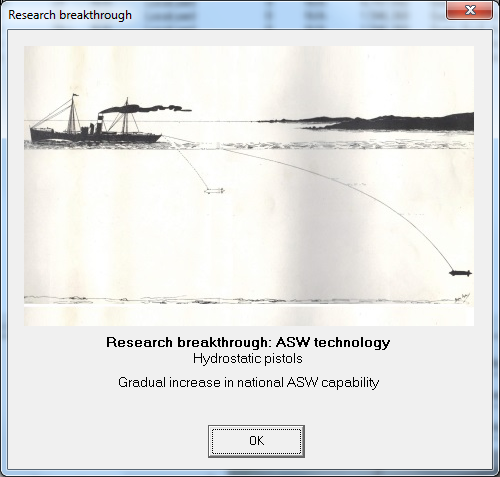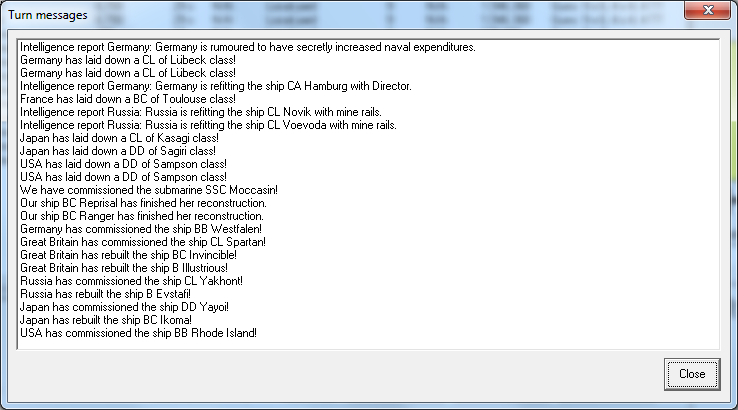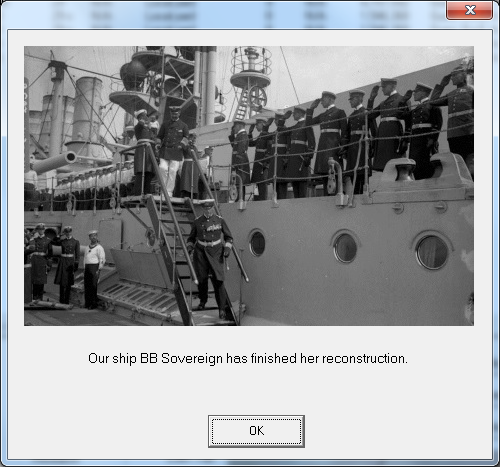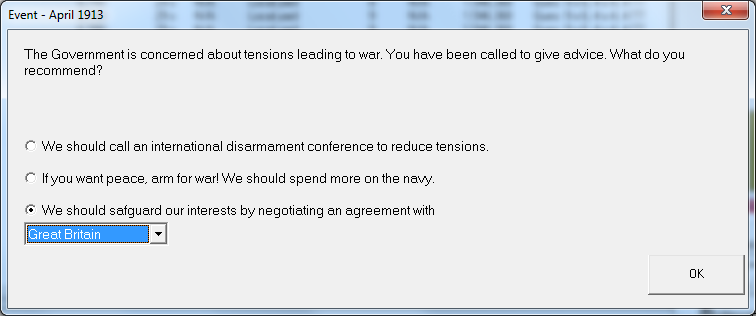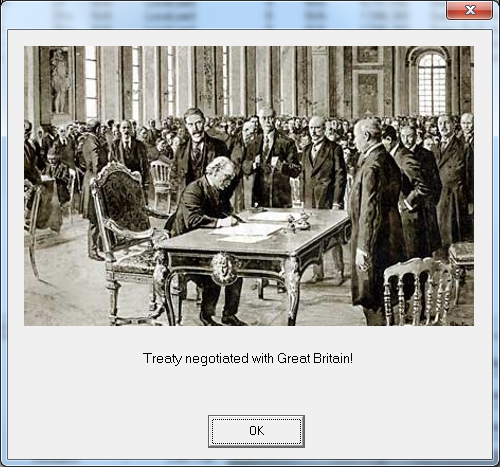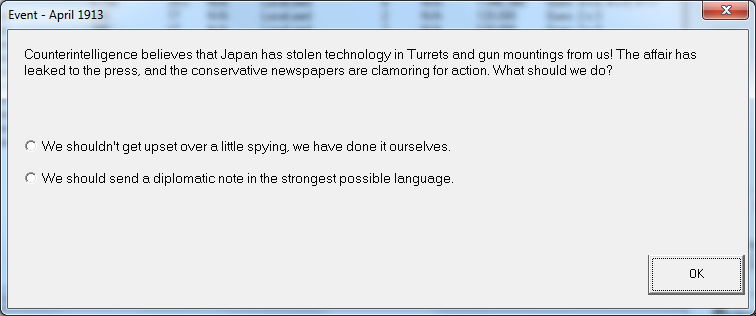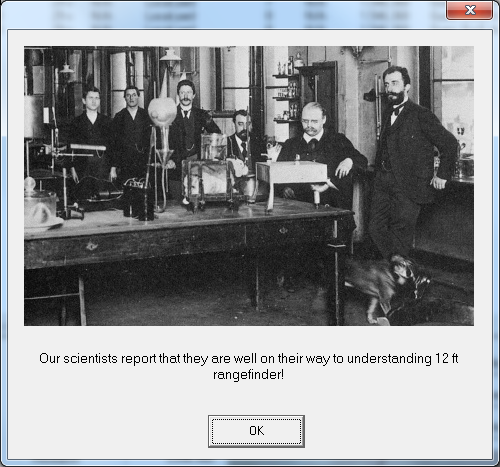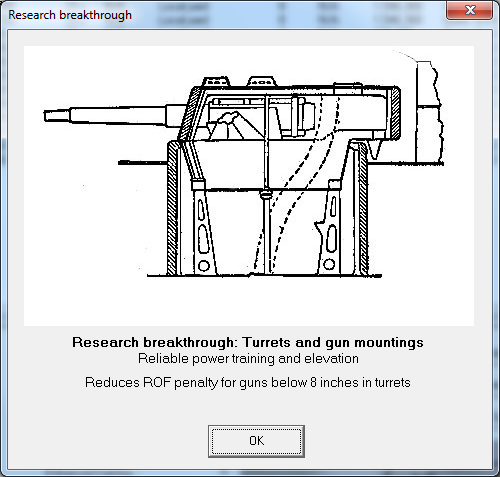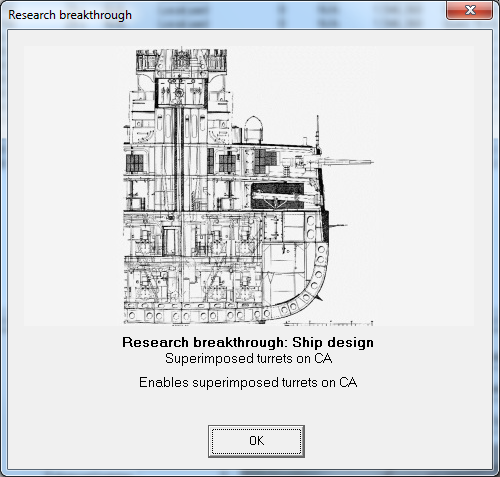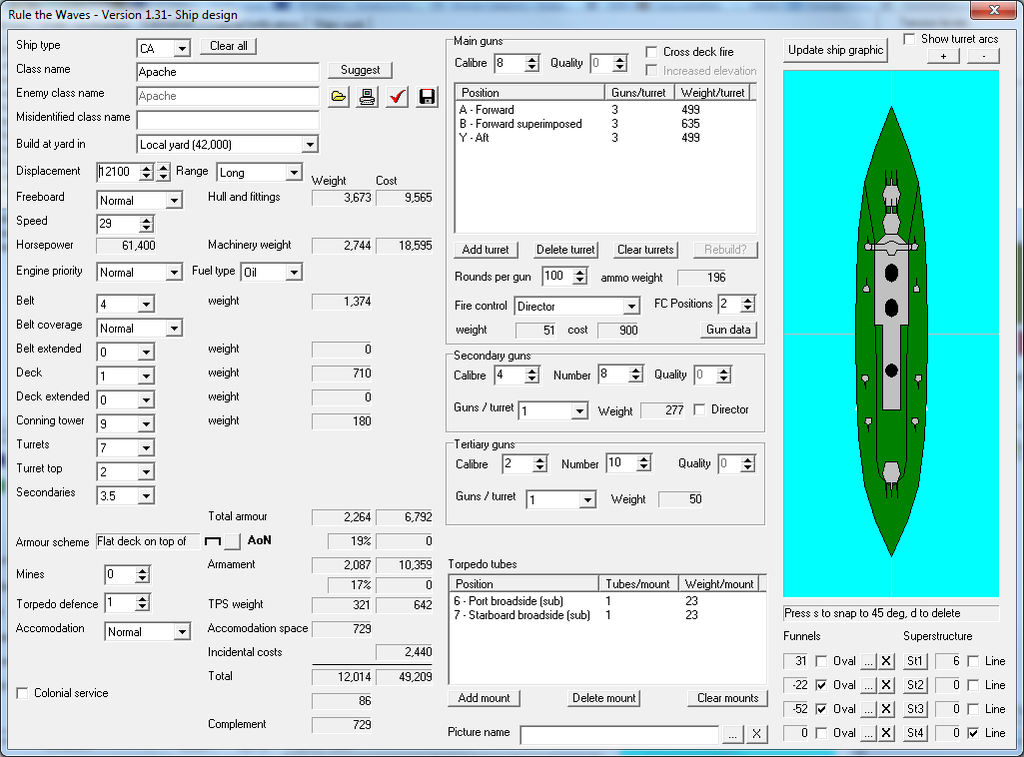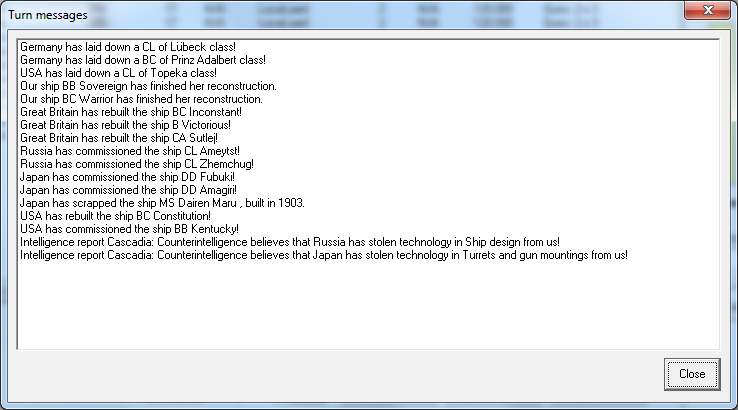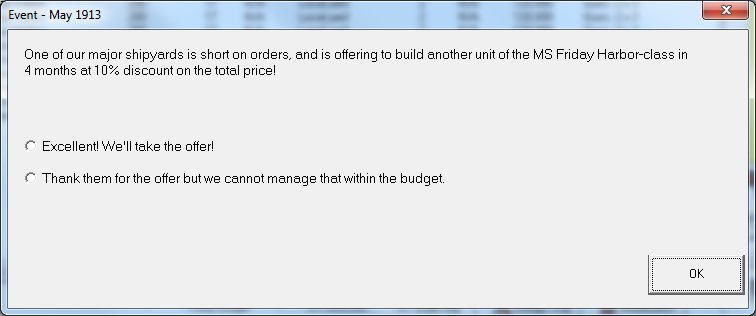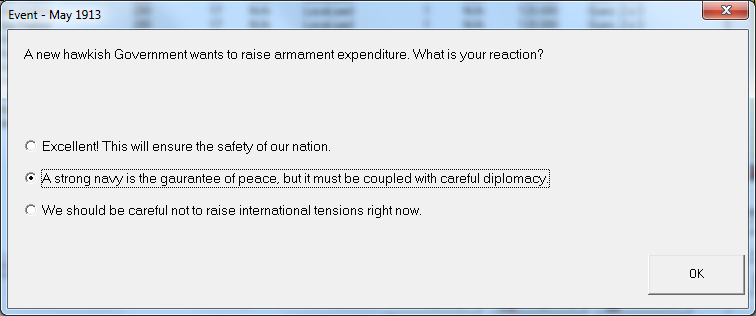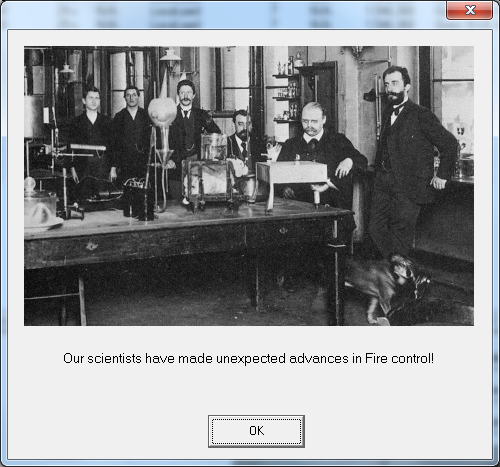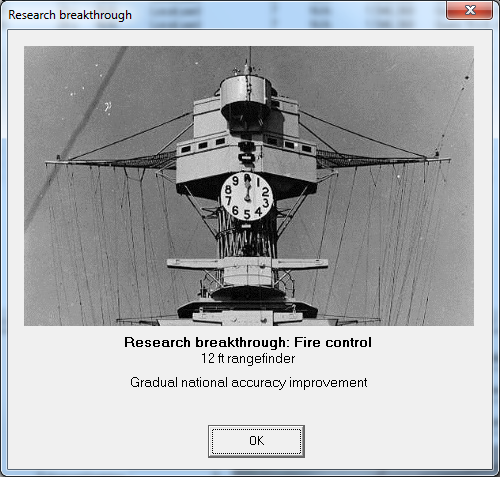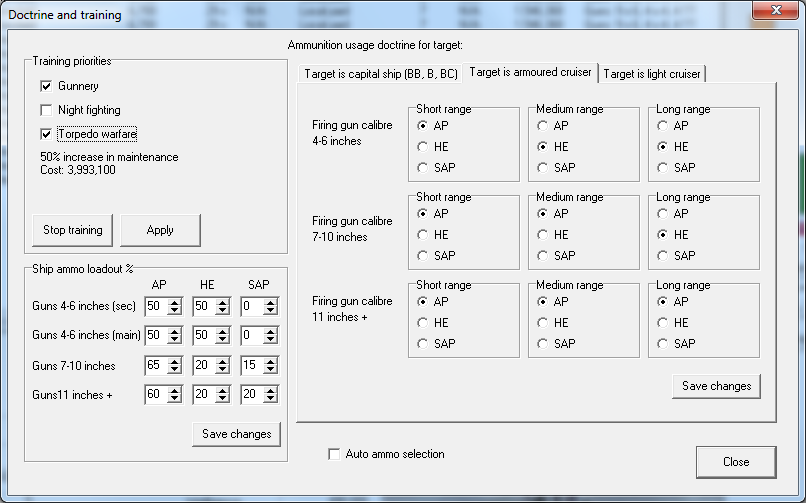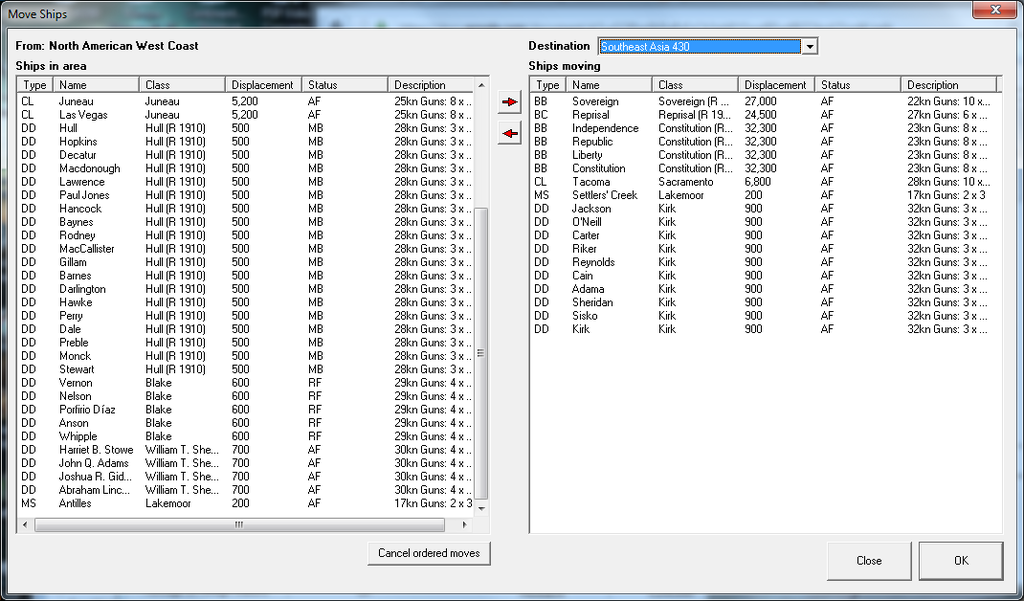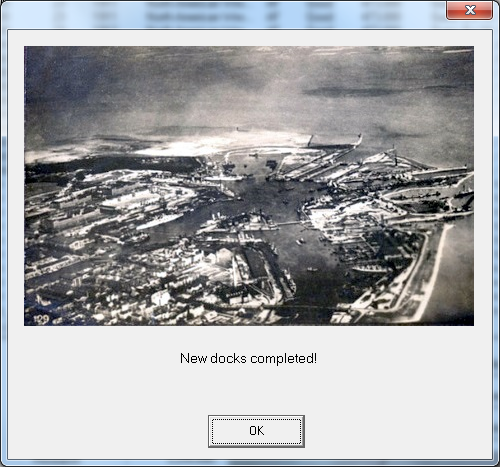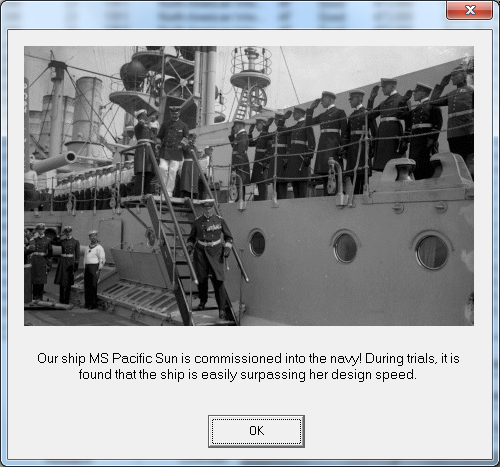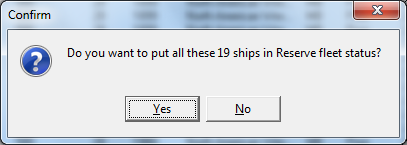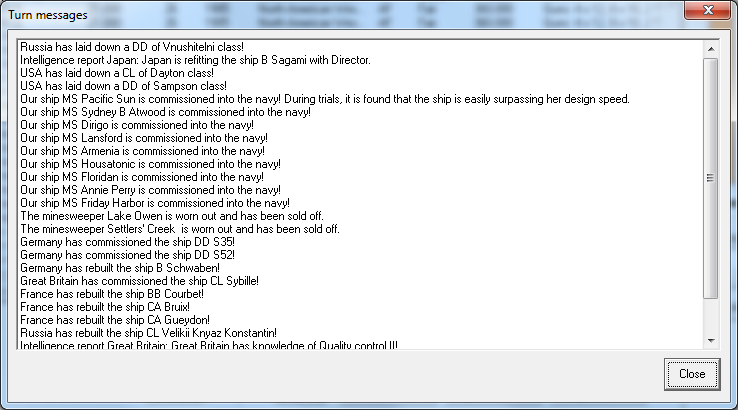Difficulties with new armor bracing techniques delay the experts in the Naval Armoring Office.
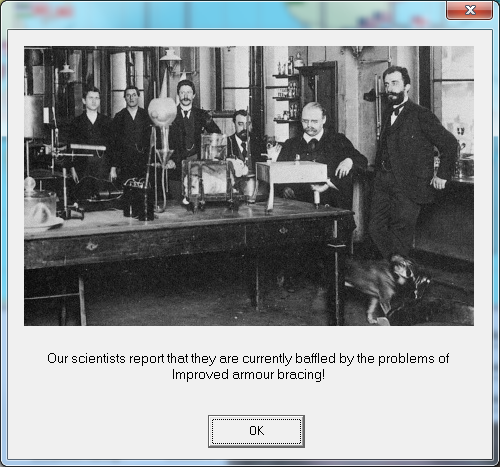
A Cascadian merchant in the North Pacific is sunk by a German submersible operating from Saipan.
French forces finish the conquest of Togoland.
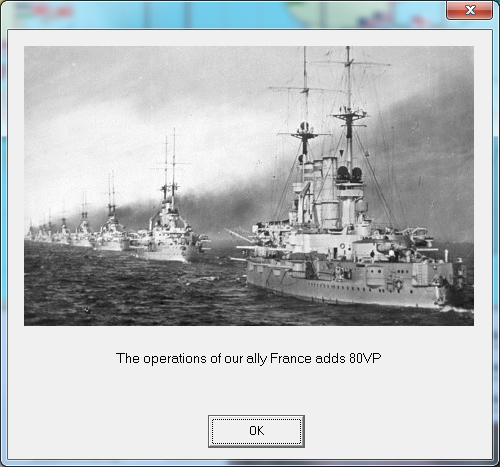
The Japanese fleet chases off a German attack on a convoy along the Chinese coast.
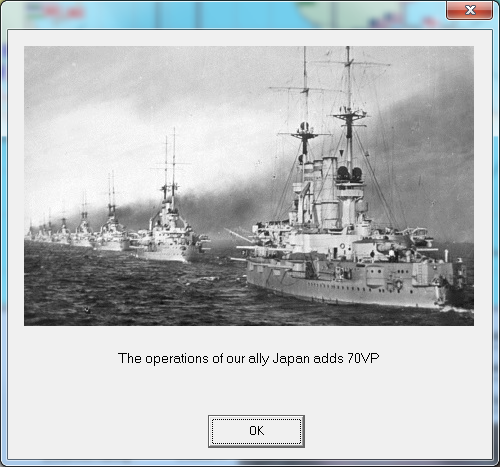
Anchorage ran into trouble when she was intercepted by the German cruisers Medusa and Bremen. She was forced to flee toward French Indochina. The German cruisers gave chase but lost the range as their old engines failed to keep the pace with the Anchorage.
Even before the Russians left the war, Representative Flagg and his Socialists caused further problems with another strike. Even the formerly-supportive shipyard workers were now starting to side with the anti-war movement, angered by the rising food prices and the failure of Lakeland's Government to impose price controls (Lakeland had successfully opposed the prospect, citing economic advisors warning that controls would simply cause producers to sell elsewhere or scale back production, causing further shortages). Due to such as trike in Bremerton, another month's delay was imposed on the construction time of the Republic.
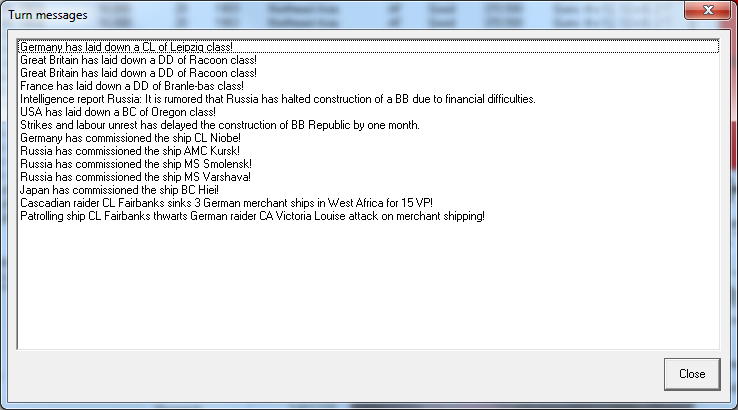
The Admiralty
Portland, Federal District
25 May 1910
Admiral Garrett and his Vice-CNO, Admiral George Cousland, looked intently over the map and the markers for the allied and enemy fleets.
With Russia out of the war, opportunity now beckoned for the Allies. The Russian Far Eastern Fleet no longer had to be monitored. And most importantly…
"We can turn the German defensive focus on the Pacific against them," the Admiral noted. He pointed out the known sizes of the German fleets across the world. "If we send a few extra ships to the French, just a few, I think they can impose an effective blockade in the North Sea."
Cousland nodded. "Agreed. It does seem to be the best strategy."
"We'll leave enough ships to bottle up the Germans in the Central Pacific and to protect our gains in China. All other available ships, though… I want orders cut for them to proceed to Brest immediately. I will confer with her French liaison officers to have further planning drawn up."
German concentration in SEAsia prompts slight redeployment of ships to France in effort to put Germany under blockade.
June 1910
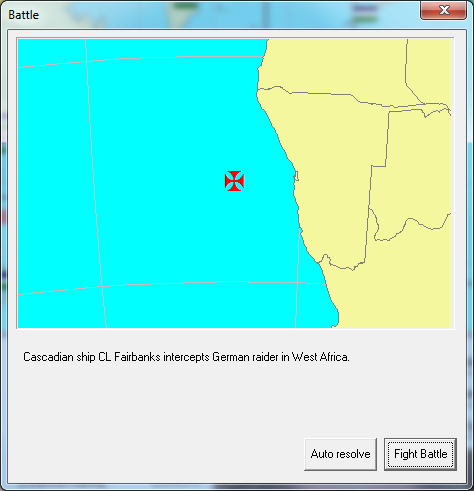
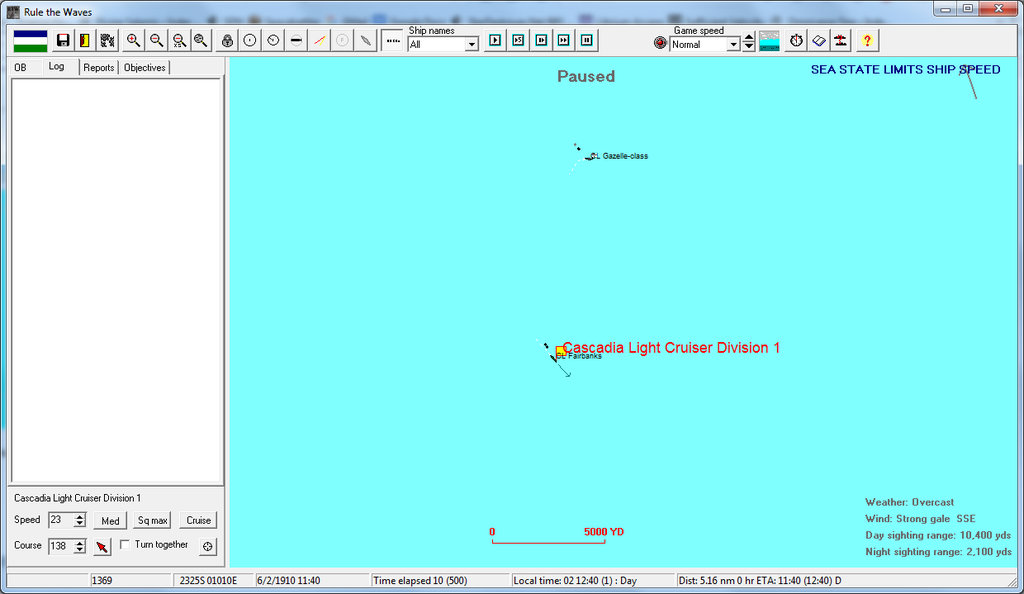
The Fairbanks found a German raider off the Namibian coast during a storm. The two ships exchanged fire and hits, but due to the sea state accuracy was abysmal and the Fairbanks had trouble keeping up. The German managed to keep ahead of them until night fell and visual contact was lost.
Another set of yard expansions completed.
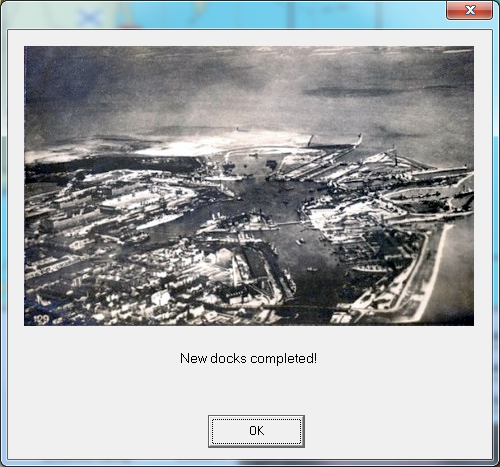
Although the anti-war unrest in Cascadia remained fairly high, the fever pitch that had been attained by the bloody spring fighting abated. Many now felt the end to be in sight with the defeat of Russia.
Representative Flagg did his part in that, urging recognition of the Russian Soviet Republic by May 15th, but he was enraged when Lakeland brought the Treaty of Sevres to the Senate. He took the floor of the House on June 13th and spent an hour raging at the Government for its "naked imperialism". "The blood of the Cascadian nation has been shed not for self-defense, not to aid the downtrodden, not to protect the principle of democratic rule from monstrous autocracy, but to appease the Imperialists who care nothing for the lives of our people! The treaty is a mockery of our nation, a travesty, a crime for which the world will never forgive us! I plead with the nation to reject it, reject it entirely! I demand a vote of no confidence against this monstrous, bloody-handed, bloodyminded, criminal-infested government immediately!"
For the moment Flagg's offended principles had trumped his political instincts. The majority of the voters, outside of his loyal Socialists, saw an end to the war with Russia as critical to bringing about general peace. The new territorial gains were perceived to be sufficient to allow Cascadia to end the war without insisting on Germany ceding the Marianas or Bismarcks (with the exception of Lakeland, who insisted that further German concessions must be made for peace). Therefore Flagg's attempt to topple Lakeland with a vote in the House failed completely. Only the Socialists voted entirely on his side. A scant handful of Democrat Doves and one dissident Liberal arch-Dove were woefully insufficient to force the vote to any level that threatened Lakeland.
Flagg's reaction was to fulminate in Socialist newspapers that the legislature of Cascadia was caught in "imperialism fever". He renewed calls for a massive General Strike that would cripple the war effort and undermine the economy. "The rich that feast on our labors will know the misery their warmongering has wrought to us," he declared. He still drew the line at violent uprising, however, perceiving (correctly) that if the Socialists tried to repeat what Lenin and Kerensky caused in Russia, the result would not be the toppling of the Cascadian government but a mass public turn against the Socialists and the Trade Unions.
Despite that calculation, Lakeland and Attorney-General Caldwell were still convinced that Flagg either intended violent revolution or that the Socialists would trigger it through their behavior. Caldwell openly proposed a bill in the Senate to make it a crime in wartime to "promote labor unrest or worker stoppages" in any "defense-related industry", with severe fines and prison sentences. Jake Roberts, in a conversation with General Landers and Admiral Garrett, declared that "I've got a thousand good boys from back home that'll set these men straight the only way it can be done. With a bullet."
With the social turmoil, it was the American Ambassador, Ronald Anderson, who opined to President Taft that "this war will be decided by the revolutionists. Namely, which ones will ultimately rise up and succeed first? The Cascadian Socialists or the German parties?"
Unrest to 7
Naval design reported further setbacks to adapting secondary wing double turrets to full-size sovereign battleships and internal torpedo storage on submersibles
.
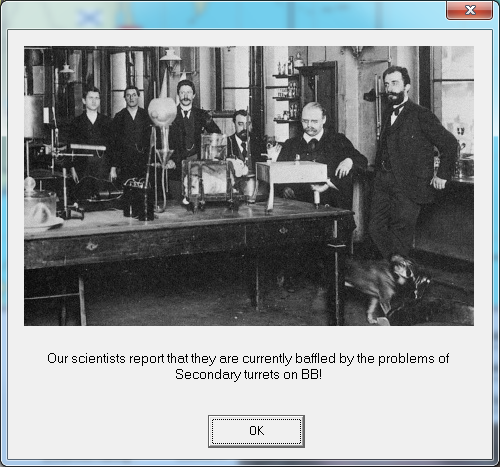
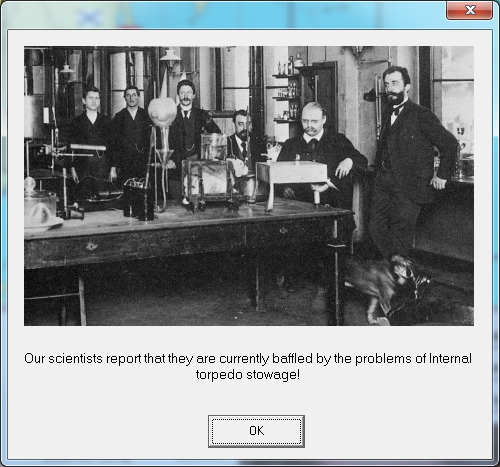
CRS Superb
Chuuk Lagoon, Cascadian Pacific Territory
17 June 1910
Captain Wallace didn't believe it when he heard it.
But now he had the undeniable proof before his eyes.
"It's cut clean through, sir," reported Commander Adams, the chief engineer of the ship. He motioned to the electric box and the cleanly severed wires. "Whoever did it knew that it would keep us from generating enough power to make steam on schedule."
Wallace felt a burning anger in his heart. "Sabotage? From my crew?"
"Has to be, sir," Adams answered.
Wallace looked to Penworth. "I want this investigated. I want all men spotted in this area questioned. And tell Major Armstrong I want Marines posted at every magazine, every fuel bunker, and every entrance into the engineering spaces. Anyone not authorized to enter is to be turned away and reported. Is that clear?"
"Yes sir."
Wallace looked back to Adams. "How long until you can repair it?"
"That's the good news, Captain. I've already sent one of my officers to the quartermaster ashore for new wiring. I can have everything back up and running within three hours of his return."
"Good. Keep me informed."
19 June 1910
Fifty enlisted sailors fidgeted as they baked under the open sun. Wallace felt the heat as well and miserably so. But he kept his back straight and continued to glower down upon his men. He hoped that it was as intimidating as the platoon of Marines with rifles that were also on deck.
The men were those determined by the investigation to either be the saboteurs or to have likely knowledge of said saboteur.
"Two days ago, someone on this ship put his shipmates in jeopardy," Wallace declared. "A critical piece of equipment was damaged. We may be thankful that this was discovered and repaired easily. But had an enemy force chosen that day to attack, this entire vessel might have been lost."
Wallace waited to see if anyone reacted. There was no clear reaction.
"Our investigation has shown that one of you men did the deed. And at least some of you know about it. There are two ways we can do this, men. One is that the saboteur has the integrity to admit his crime and step forth to accept justice, or barring that, one of you who knows the offender admits it so that justice may be done." Wallace's expression was grim. "The other is that I turn this over to the Naval Investigative Service. You will all be kept in the stockade here on Chuuk for the rest of the investigation, which may last months. You will not be allowed to go home even should the war end tomorrow. And your lack of cooperation will be duly noted and used against you in a general court-martial, and any man sentenced to further stockade time can look forward to the Navy Stockade on Alcatraz."
"What will it be, boys?"
There was quiet for a moment. Sullen, angry quiet. These men were troublemakers, going by the testimony of other sailors and the petty officers. Socialists, rabble-rousers, or just the usual authority-hating sailor who resents anyone who can give him an order.
Finally one stepped out of the crowd. "I won't be havin' you punish these lads over nothin', sir," declared the sailor. His accent was Irish, but not thickly so. A first class rate going by his chevrons. Dark hair was matted to his head and piercing blue eyes glared at Wallace. "I did it."
"You would be, sailor?"
"Daniel Greevy. Machineryman First Class. I've been in this Navy for five years now. I signed up 'cause I thought we were better than Europe. If I knew then what I knew now, I wouldn't ha' given the Navy a time of day."
"And so you sabotaged the ship?"
"Aye. I wasn't havin' ye an' th' other bloody bastard officers of th' Navy take these puir lads off t' die," Greevey declared. "Not fer what this's become. Cascadia's lost 'er soul. You an' yer kind have turned us int' another bloody Empire, lordin' it over other folk who don't want us about. I'm not goin' t' be part of that."
Wallace nodded. "Very well. Sergeant."
Sergeant Carter, the commander of the Marines present, stepped forward and took Greevey's arm. "You can't shut us all up!", Greevey shouted as he was pulled away, to be taken to the Chuuk stockade. "We've had it with ya! We've had it with this whole damned war!"
Greevey continued to shout such things until he was on the boat and bound for the stockade.
"You are all dismissed!", Wallace shouted. One by one the group broke up. Many started to mumble as they did.
"This will be trouble, sir," Pentworth said. "They're all as angry. They might do worse."
"I know, " Wallace replied. "See if we can get the worst of them transferred to shore postings."
"There aren't many replacements left in the pool, sir. We might not be able to replace them all."
"Do what you can," Wallace insisted. His faint Scots brogue started to sound through his trained neutral voice."I can't have saboteurs runnin' about on my ship."
He went off to file his report.
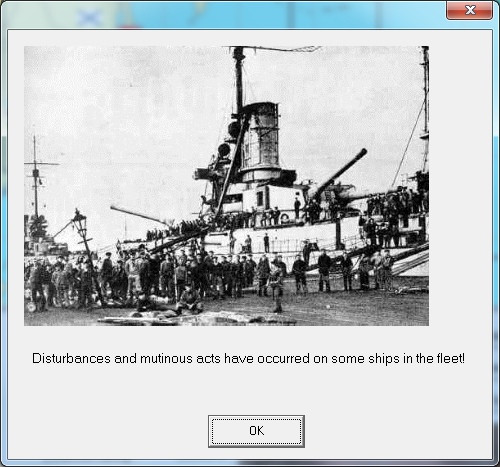
With Germany having pledged to fight on, the War Office completed the summer call-ups. A new wave of draftees were prepared for the front.
This sparked a massive series of protests in every major Cascadian city. Citizens from all ethnic groups and walks of life demanded the war end, and end now. The idea of fighting on seemed ludicrous, and the fact that Cascadian men were still dying by the dozen every day, indeed every hour, only further angered the populace. The popular support for the war that had existed had gone out with the disappointment that the Russian collapse had not caused a German one.
This was the wave that Flagg pushed further after his failed attempt to topple Lakeland's support in the House. Large numbers of people were now calling for Lakeland's resignation or dismissal from the Cabinet.
Lakeland's reply was to breathe defiance. "I am here to bring our country victory, no matter what these Socialist dupes do to stop it. We have fought too long and too hard to miss out on expelling Germany from the Pacific."
His defiance was partly an act. Lakeland had the support of the Conservatives and Roberts, but the Democrat Hawks and the Liberals in his coalition Government were wavering as the war drove the left's popularity up. McInnes and Juan Morales were becoming the centerpoint of an anti-Lakeland clique in the Cabinet, with President Matthews' blessing. Lakeland had to keep the appearance of control or lose his position.
So he marched on, ignoring the growing demand for peace in the country.
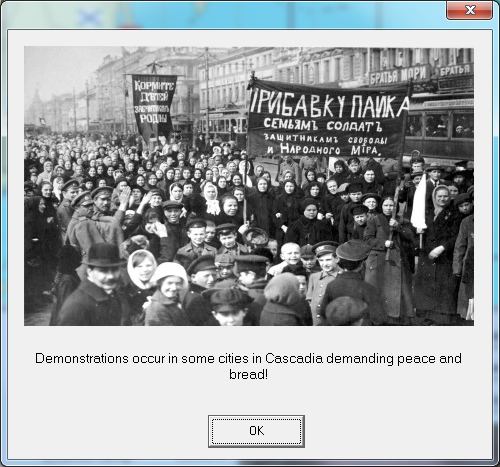
A German submersible was sunk off the French coast.
1 German sub sunk
The Marine Nationale launched another attack into the North Sea. Yet again meeting the Germans off Texel, this time it was the French who took the lumps. Their newly commissioned battleship Massena, an early attempt to match Cascadia's Sovereign with six 14" guns as main armament, was torpedoed and lost electrical power. The French force was forced to abandon her to her fate by the German numbers, allowing the Germans to finish the Massena off at their leisure.
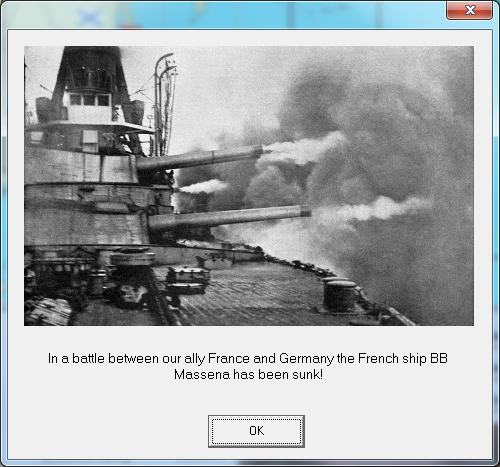
The Relentless and other vessels were diverted to France to begin building up Allied naval forces sufficient for a blockade of Germany.

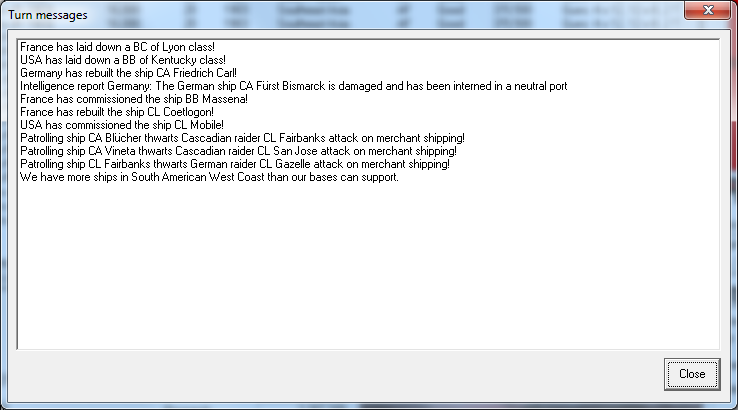
July 1910
On the 1st of July, the German Army launched its summer offensive.
The offensive was aimed along the Allied lines north of Metz. The goal was to cut the north road leading into the city. At this point, an offensive farther south would attempt a crossing of the Moselle to cut off the Allies to the South.
But immediately the German offensive ran into trouble. The Cascadian 2nd Army, the immediate target of their offensive, was not the shattered formation that had existed in May. It was, in fact, an entirely new formation, made up of a mixture of fresh troops stiffened by battle-tried regiments from the other Armies, including 1st Army's 1st Guards and 7th Army's 4th Guards, while the original formations of 2nd Army had been rotated out into the other Armies as reserve formations. The Cascadian Army had hidden the rotations by shifting troops at night and issuing them uniforms with the removed units' patches, as well as instructing that the original unit markers in the trenches be kept in place.
As a result, the German time table was throw entirely. More troops had to be committed to gaining breakthroughs, and in the meantime the French were able to commit a new Army, the 18th, to the fighting to assist the Cascadian defenders.
By the 7th of July the Germans had advanced only 200 yards. Small gains, and at great cost. Nevertheless it was a slight success and the German Army prepared to send reinforcements in.
But news from the homefront stopped them. Starting on the 7th, Germany was rocked by nation-wide demonstrations and protests. The German trade unions, supporting the peace plank of the SDP, waged a General Strike and filled the streets.
The German Government panicked. The fear was that their left would repeat the success of the Russian left. Troops were ordered back from the front to help provide security, especially in the vulnerable Ruhr industrial district. As a result of this new commitment, von Moltke was ordered to suspend his offensive.
The crisis brought down von Bülow. Theobald von Bethmann-Hollweg was called in by the Kaiser, who feared suffering the same fate as his cousin Nicholas. The Kaiser instructed Bethmann-Hollweg that he was ready to make further concessions for "an honorable peace". The German minister in Geneva was wired to approach the Allied diplomats with a new peace proposal and counter-terms. If need be, Germany would agree to abandon Tsingtao to Cascadia.
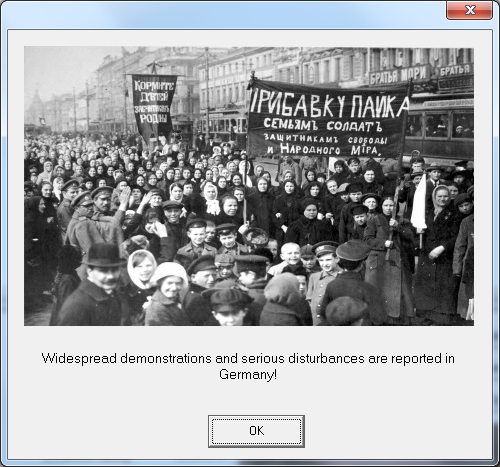
The Cascadian Admiralty issued new orders for parallel cruising formations to be implemented after war experience and case studies work proved their worth.
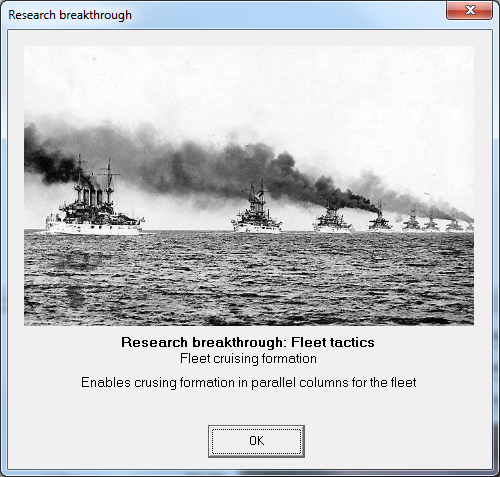
A German submersible operating out of Guam caught and sunk a Cascadian transport that strayed too far north from the Carolines.
The French fleet, responding to Cascadian requests for further support in the Pacific, bombarded New Britain.
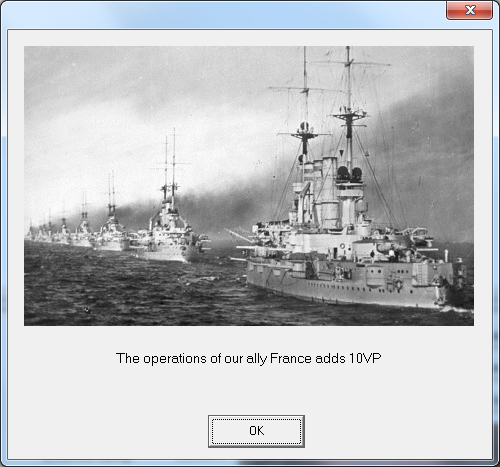
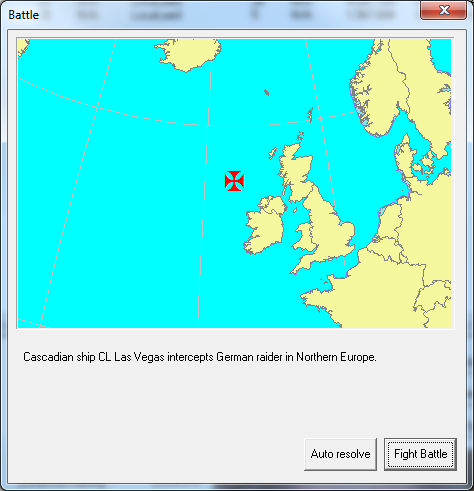
The Juneau and Las Vegas intercepted the German raider Hertha in the waters off Ireland. The two cruisers initially considered closing and trying to torpedo the heavier, better-armed ship. But damage to the Juneau forced that cruiser to pull back, allowing Hertha to slip away to the east.
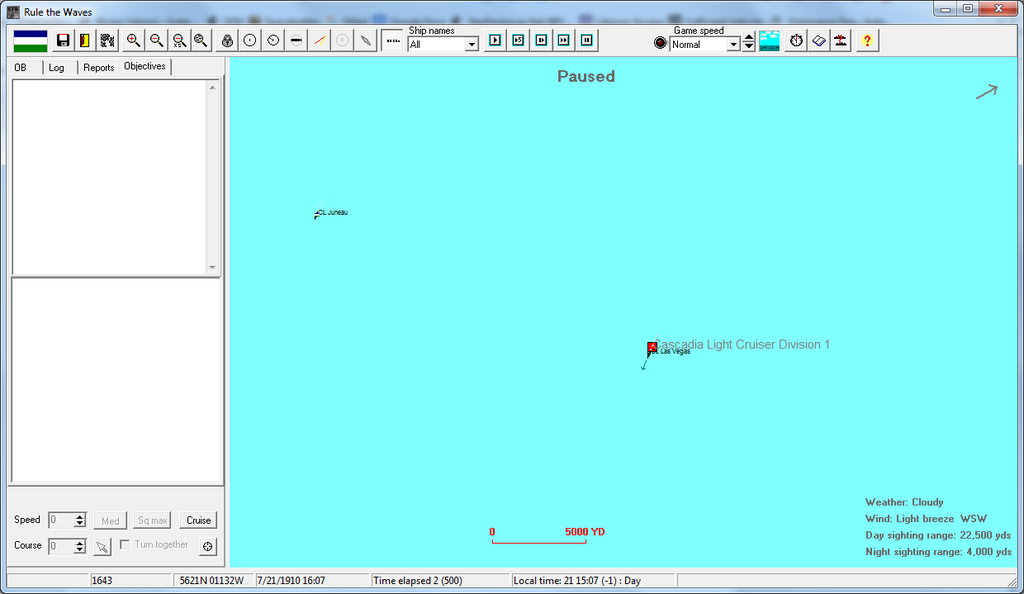
A wartime steel shortage caused in part by work stoppages delayed the Republic again.
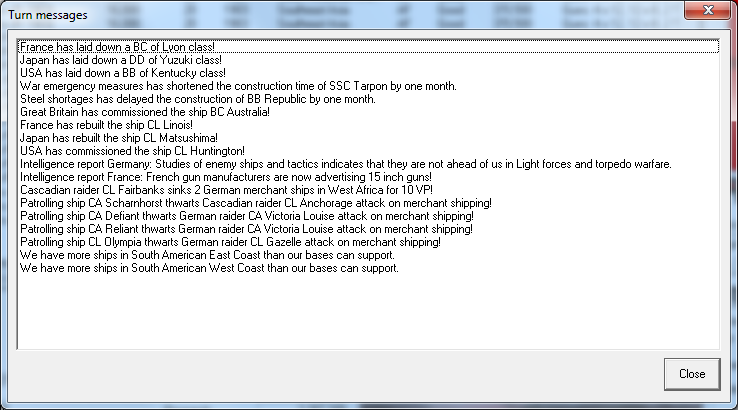
On July 19th, the German peace offer delivered via the Swiss delegations of the belligerents arrived in Portland. Germany categorically refused to withdraw from the Pacific, but it would accept Cascadia's takeover of Tsingtao if German citizens were compensated.
More painful was Germany's situation with France. Bethmann-Hollweg had to deal with the fact that France had secured the region around Metz, and it would take profusions of blood that the German nation was not willing to support to restore the 1871 border. Bethmann-Hollweg thus offered to redraw the border, restoring the Francophone communes and areas of Lorraine to France in exchange for French withdrawal from Togo and Cameroon.
The new Chancellor sold the peace to the Kaiser as "honorable" because, as he said it, "not one millimeter of soil held by the German Army will be surrendered", which would be for the most part true.
The response in Paris and Portland was not encouraging. In Paris Clemenceau led a group in the Assembly that declared that any peace must have a return to the pre-1871 border. Delcassè was opposed to returning Togo, believing France should not abandon what her colonial forces had conquered.
In Portland, the peace offer was exactly what Matthews and McInnes had been looking for. Matthews was ready to sign it on his own cognizance, in fact, but he needed to make sure he could prevail in the Senate despite the likely opposition of Lakeland. This consideration was only reinforced by Lakeland's response in the Cabinet. Lakeland, aware of the social disturbances in Germany, was convinced that just another month or two would see a German Revolution, and Cascadia would able to impose terms that would forever remove Germany from the Pacific Ocean. He and Roberts refused to countenance the peace offer.
Quietly Matthews began consulting Senators on their support for the peace offer, cajoling Liberals and Democrats on the matter. If he could get a majority of both, he could carry the Senate against Lakeland's remaining support.
August 1910
The mood in Berlin became stern. Either the war must end now, or Germany would fight to the bitter end. Seeing the mood of the Kaiser and the leadership, Bethmann-Hollweg wired President Matthews about the peace. His warning was clear: Cascadia must sign the peace treaty or he would lose to the hawks, and the war would become a fight to the finish.
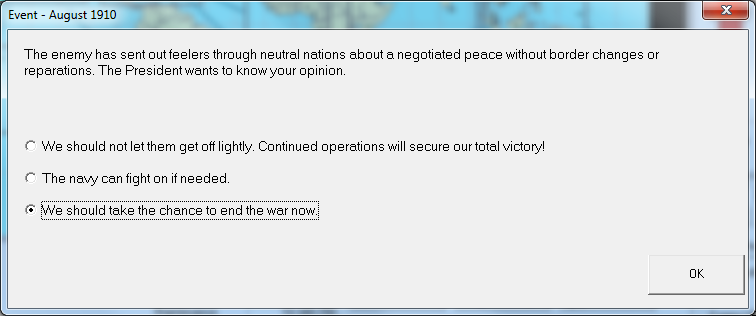
President Johnathan Matthews has been unappreciated in our history It is common to depict him as a figurehead, a man swayed by stronger Cabinet men, who went from Lakeland's side to McInnes solely from the force of McInnes' arguments and his fear of Socialist uprisings. This is unkind to the memory of man who thought with sober reflection and who worked to keep a volatile political situation stable. President Matthews became leader of his country at an extraordinary time, as Cascadia and her people struggled to determine their identity and the future that the nation wished to follow. Faced with a seemingly-impossible task, of managing anti-imperialists and expansionists, Socialists and Conservatives, Hawks and Doves, President Matthews performed the role specified to the Chief Executive of the Cascadian Republic with sublime skill. Too sublime, perhaps, for his memory to posterity.
And there is no finer argument to his skill as a leader and his capacity for a strong stance than the peace signed in 1910." - Excerpt from "Johnathan Matthews: In Remembrance" by Sophie Garrett, published in The Liberal Party Historical Journal, Vol. 2, May 1948
An election year loomed, and Matthews used that to full effect in the Senate to secure peace.
On the 8th of August, 1910, Yancy Harlwood, Minister of the Cascadian Republic to the Swiss Confederacy, signed the Geneva Peace Accords with his German, Japanese, and French counterparts. The terms of the treaty were a compromise of the requirements of the warring Allied governments.
France regained Metz and the Francophone regions of Elsass-Lothringen, most of which were reclaimed in the Spring Offensive earlier in the year. Germany would retain that which her armies had successfully held, as well as regaining a couple of Alsatian towns that fell to the French advance in exchange for the small portions of Francophone Lorraine still behind German lines. Under the treaty the French withdrew from Cameroon as a term to balance out the greater German withdrawals in Alsace-Lorraine compared to the French. Togoland was signed over to France as it had fallen to the French colonial arms already.
Germany recognized Cascadian control of Tsingtao and Kiautschou Bay. German citizens who lost property in the fighting would be reimbursed by a fund commonly funded by the German and Cascadian governments. Cascadia agreed further to pay reparations worth approximately £500,000 for the damages and disruptions caused to the plantation economies on Saipan and Tinian for the De la Vega Revolt.
The Japanese minister in Switzerland tried, in vain, to persuade the Germans to sell the Northern Marianas islands to Japan. But the German Government would not budge; Germany would not give up territory she had not lost in combat and Japan held nothing to exchange as the French did. Instead the Germans, and the other Allies, agreed to recognize Japanese control over Korea in its entirety and Japan's preeminent position in Manchuria. Minister Harlwood, recognizing the delicacy of the issue of Port Arthur, inserted a term by which Cascadia agreed to give Japan military access to the port for their Manchurian positions even if the alliance treaty expired, with a one year warning required should the alliance end and Cascadia decided to rescind said access. Germany, France, and Cascadia would consult Japan should any new alterations of their standings with China be contemplated.
The peace treaty was as good as it could get for all of the parties. None of the leadership wanted it to fail; all feared the growing specter of Socialist Revolution in their nations and supported from Russia, where Lenin was steadily out-maneuvering Kerensky and imposing more authoritarian controls over the Russian Soviets.
And yet, the peace treaty barely survived ratification.
Japan had the hardest fight. Many Japanese grumbled about the lack of territorial concessions from Germany. Some sentiment was that Cascadia had profited from Japan more than Japan from Cascadia. These expansionists were not satisfied with Sakhalin, Korea, and inland Manchuria - they wanted control of Tsingtao and Port Arthur too. Together with other elements they resisted ratification until the dawn of 1911, even if peace was officially restored earlier and recognized by the Japanese government.
In France the peace proved to hit a sweet spot. Delcassè and the colonial clique were satisfied by the acquisition of the Togoland conquest. Archrevanchists reviled the continued loss of Alsace, but the regaining of Lorraine permitted many revanchists to support peace with a clean conscious. The French would ratify first despite Clemenceau's attempts to thwart it.
In Cascadia, Lakeland made his opposition to the treaty known in the Cabinet meeting before it was even signed. He accused Matthews and McInnes of bypassing the Cabinet and demanded McInnes resign. As far as he was concerned, no peace could be accepted that did not involve a withdrawal of Germany from the Pacific.
It was a sign of Lakeland's faltering grip on power that he could not force McInnes' resignation. McInnes pledged to take it to the Senate, along with the treaty. Lakeland attempted to force the issue with a Cabinet vote against the peace treaty. But the Cabinet did not have ratification powers, the Senate did, and the Cabinet's sole role in the treaty-making was to pass the treaty on with recommendations. With only that option Lakeland did succeed in a close vote on recommending the Senate refuse to ratify - Roberts and the Conservatives backed him, but Morales and the Democrat Hawks backed McInnes, and it was only by the vote of the Liberal Hawk McKiernan, as Territorial Office Secretary, that the Cabinet voted to recommend refusal.
On August 12th, a Friday, Lakeland introduced the Geneva Peace Accords to the Senate and communicated that the Cabinet recommended rejection. He had intended said recommendation to be his sole statement on the issue and let the Senators take his cue.
But Matthews and McInnes had laid their ground well. Senator Allan Cushing of Columbia, leader of the Dove Opposition in the Senate and of the Democrat Doves overall, immediately called for the President to speak. Peter Algernon Hinckley of Nevada, the other Populist Senator beside Roberts and the Coalition's pick for Speaker of the Senate, tried to rule against bringing the President in. But Cushing called for the Senate to compel the Speaker and won the resulting vote. That was a thunderbolt to Lakeland and Hinckley and a premonition of what was about to go wrong.
President Matthews was called for. Within the hour, as the Senate stewed, the President appeared and accepted the Senate's request for a statement. President Matthews delivered one of the best addresses of his career.
"The war has met its reasonable termination and the gains we have made are all that we could have hoped for when we embarked on the course of war two years ago. Now our bleeding nation pleads for peace, so that we might bind up our wounds.
The voice of ambition does persist, yes. The voice tempting us that continued war will go in our favor, that the German Empire might be compelled to give in to our wildest demands if we maintain the pressure. But Ambition has a voice like the serpent of Eden, a tempter's soothing hiss promising greatness, actively deceptive of the facts on hand.
The fact is that the Cascadian Republic must have peace. Our nation, still so young, cannot continue to fight at this pace. Our treasury is depleted. Over three hundred thousand of our sons are dead in distant Europe. Our markets suffer from higher food prices and the loss of overseas produce. Our merchant ships rust at the quay, unable to afford the insurance protections against the enemy raiders preying upon our lifeline to the world.
Most important of all, the People plead for peace. The citizens of our nation, whom we serve in the name of, plea to us. Their plea to us, Honored Senators, is a simple plea many a war-weary man has cried over the centuries. 'Peace! In the name of God, peace!'
Our people long for the restoration of calm and the return of prosperity. And our acquisitions in the Far East call for the attention of our energies, so that they may be administered with justice and propriety by the Cascadian Republic. The honor of the Republic will lie with that cause.
Do not let the voice of temptation sway you, Honored Senators, this I plead of you. We might yet suffer the fate of poor Russia if we ignore the pleas of our war-weary nation. We will certainly condemn more of our brave sons to death. For our nation's sake, for God's sake, let us have peace."
The President's speech swayed some of the fence-sitting Liberal Senators. As the afternoon fell and Senator after Senator agreed with the ratification, Lakeland became desperate. He realized he needed to show just why he had such faith in victory.
So, in despair, he called for the commander that could yet doom the German Empire in the Pacific. He called for Admiral Garrett.
The Houses of Parliament
Portland, Federal District
12 August 1910
Admiral Garrett stepped out of the car and to the street side. The great marble dome of the Parliament's Senate House loomed over him. It was a beautiful structure, made in Roman style and resembling the US Capitol, while the House of Representatives across the street looked like the Parliament Building in London. Like many things, the two structures represented the two origins of the Cascadian Nation, the merged heritage of England and America.
He still held the notes in his hand. One came from the Speaker, Senator Hinckley, informing him that the Senate requested his immediate presence for consultation. The other was a note from the President. It said only "Please do right by your country".
Given the news from Geneva, it wasn't hard to figure out what was being debated.
The Parliamentary Security Service showed him in. They followed him through the hall. He knew where he was going from experience. A walk of several minutes brought him to a side entrance into the Senate Chamber.
The Cascadian Senate was nearly the size of the American, even though the US was still the larger and more developed nation. The reason was the nature of Cascadia's centralized federation and the combination of English and American constitutional principles. Whereas the United States had two Senators per state, both elected by state legislature (although the US was said to have an amendment to go to popular election close to passing), the Cascadian Republic gave each province three Senators, each with a different method of appointment or election for six year terms. One Senator was by appointment of the province's governor. One, in turn, was elected by the provincial legislature. And the third was elected by the populace of the province. Thus the Senate was evenly divided between representatives of those three groups.
The Admiral entered in full formal uniform. His blue-gray jacket was covered in ribbons and decorations. The Cross of Victory, the Pacific Cross, and the Medal of Valor all kept to their proper places. The new French Legion d'Honneur medal had joined his other medals (his counterpart in Paris had a Cross of Victory). The ribbons, for those who knew what they meant, spoke of the stations he had served in his career. The East Asia Squadron, the South Pacific Squadron, the West African Squadron on anti-slavery duty in the late 70s, the Atlantic Service Ribbon for his time with the Cascadian ships sent to support the Union blockade of the Confederacy in the Great North American War, the Siege Ribbon for his ship's role in supporting the siege and eventual taking of Charleston, the Marine Action Ribbon for working ashore with the Marines after the fall of Savannah… And that was only his early career, not counting his time as a ship captain and admiral or the Spanish War.
Even for those who did not know what those colors meant, the sheer number of them was enough to give meaning to his experience. He had served in the Cascadian Navy for 40 years, ashore and afloat, and had risen to the very top of that service. Now he was one of the most famous admirals in the world.
But all of that power was still subordinate. Subordinate to these men before him, to the leaders of his nation. Even as the Fleet Admiral of the Cascadian Navy, he was ultimately there to serve.
And serve he did, taking the podium before the speaker's box. He stood at attention and saluted the President, who nodded and bid him to stand at ease. He turned and placed his gloved hands on the podium. "Honored Senators, Mister President, and members of the Cabinet, I report as ordered."
"I have been asked by the Speaker of the Senate to comment to you upon the state of the war. And on whether or not we might attain victory soon through force of arms. It is my duty to inform you that as of right now, I cannot guarantee such a swift victory."
There was quiet in the Senate.
"War is uncertainty. You never know the enemy's plans entirely. You cannot always know where he is. And ultimately, you cannot predict what may or may not turn the tide of a battle. If we continue this battle, none can predict the result upon our Nation."
He could see some faces glower. Given that one of them was Lakeland, it was obvious whom he was offending.
One of the sixty-three Senators present took the floor. "What about a blockade? You can send ships to France and together we can blockade the Germans until they submit."
"I am indeed sending ships for that purpose. But I cannot guarantee the blockade can be sustained with what ships we send to France. The Germans will adjust and their fleet is still the larger numerically."
"It is my advice to you, the Senate of the Cascadian Republic, that if an honorable peace has been signed, it be ratified."
He could have said more. He could have echoed Matthews' words of the need for peace. They were the words he held in his heart.
But he did not. It was not his place.
When he had clearly stopped speaking, many in the Senate gave him polite applause.
Admiral Garrett's advice was not the last act of the ratification. Lakeland, at this point, put everything on the line for his argument that the war should continue until Germany ceded its remaining Pacific territories. In a move showing his combative nature, he put his Government itself on the line, declaring his Cabinet wholly against the peace treaty. If the Senate voted to ratify anyway, he would be compelled to resign with his Cabinet. And with the elections for the Parliament just three months away, there was reason to fear that a chaotic fight in the Parliament over a caretaker regime might be fuel to the fire for Socialist advancement.
But the Senate called his bluff. By a vote of 39-24 the treaty was ratified.
The First Pacific War was over.
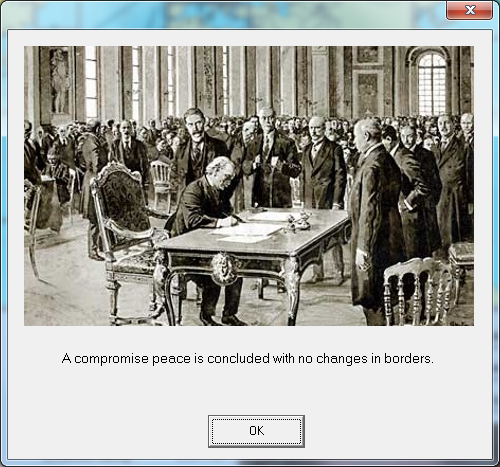
Author's Note: I feel i must explain this. Yes, the compromise peace window says "no changes in borders". Yes, I ignored that with a border re-arrangement. Here is my reasoning.
This is not a Paradox game, for one. Once I took Tsingtao, Germany could only get it back with a counter-invasion or if I had lost the war and they could claim it in the peace. So yes, changes in possessions can happen with these peace outcomes because any successful invasion leads to an immediate transfer of ownership.
In the game mechanics, this war was a draw. Even though I had more VP, even though I took over a German possession, Compromise Peace = Draw. Unless the game puts the Russian collapse first, this war will probably be gray at my end-of-the-game timeline instead of green (for a victorious war). And so I wrote the end to show that. The war ended where the armies were standing, for the most part. A little horse-trading on the European border, and extending to France not taking anything in Cameroon, but that was it. No side gave up significant territory they still held at the end of the war. A compromise on territories was found. And so we had a compromise peace.
That is my logic, my reasoning, and I am sticking with it.

Germany US tensions at 3. UK France and Russia at 1. Japan at 2.
Naval Ordnance reported that torpedoes could be outfitted with preheaters now.
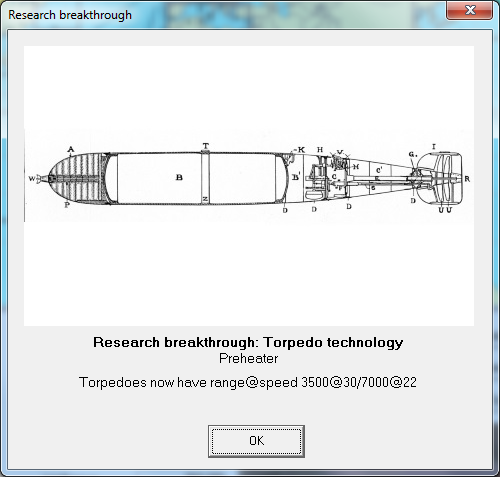
Unrest down to 3
With a cut to the naval budget from the wartime highs, Admiral Garrett ordered an end to the costly enhanced training that had been maintained for the last few years.
Additionally, the fleets spread across the world were summoned back to their home bases in Puget Sound and San Francisco Bay. The standard cruiser and destroyer detachments would remain on station in East Asia and the South Pacific to protect Cascadia's Pacific empire.
For further cost-savings, the four pre-sovereign battleships would be put into reserve status upon return to Cascadia. All of the old Hull-class destroyers were ordered into mothballed status.
Under the terms of the Geneva Peace Accords, the Empire of Japan assumed total dominion over Korea.
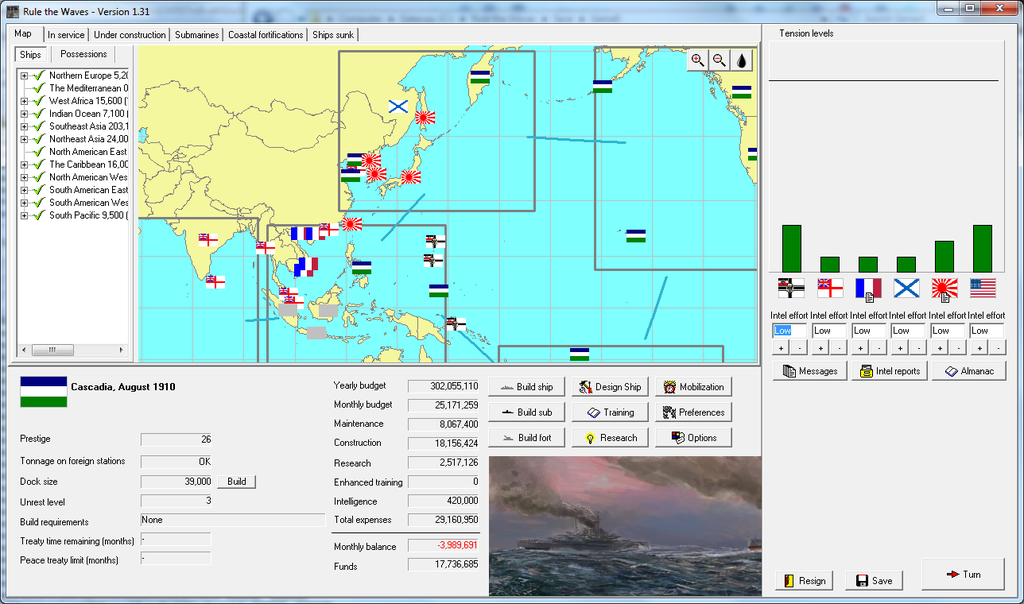
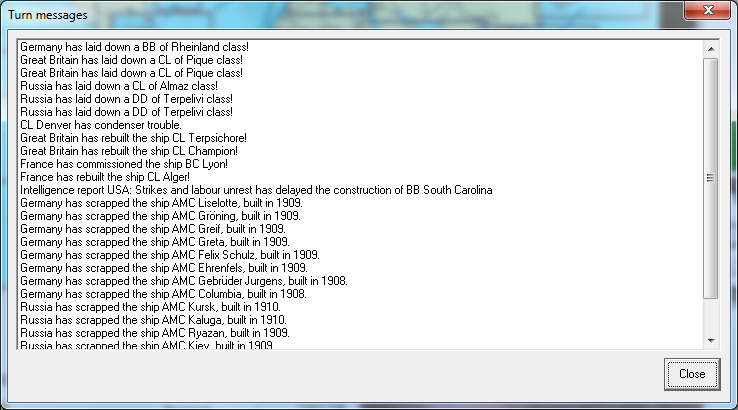
Post-war Alamanc:
